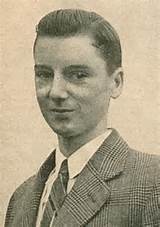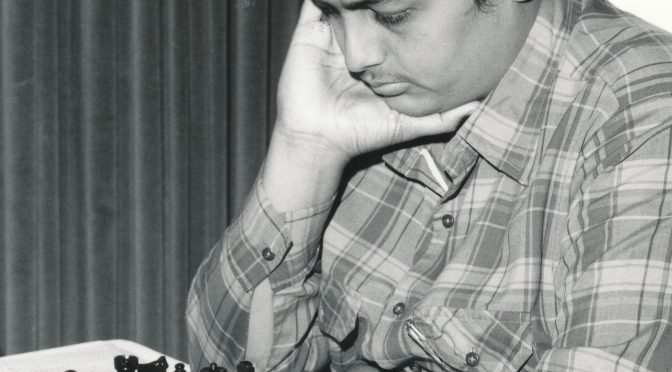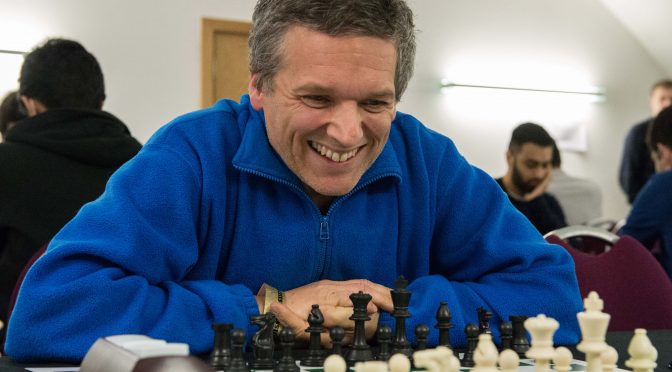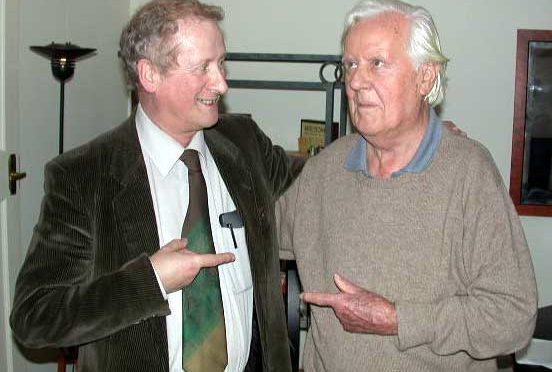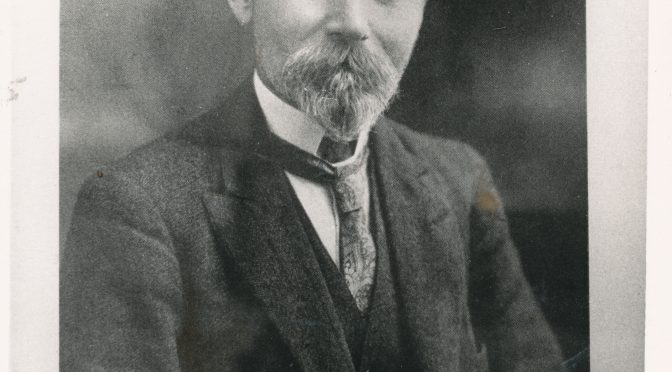Remembering Frank Parr (17-xii-1918 28-xii-2003)
Category Archives: Player
Happy Birthday IM Vaidyanathan Ravikumar (26-xii-1959)
Vaidyanathan Ravikumar (“Ravi” to his friends) was born in Paramakudi, Ramanathapuram, Tamil Nadu, India on Saturday, December 26th, 1959. On this day Nelson Rockefeller announced that he would not seek the Republican Party nomination for 1960.
Ravi credits his father N. Vaidyanathan for help with his early chess development.

In 1978 Ravi won the Asian Junior Championships in Tehran and was awarded the International Master title as a consequence. Ravi was India’s second International Master : Manuel Aaron was the first in 1961.
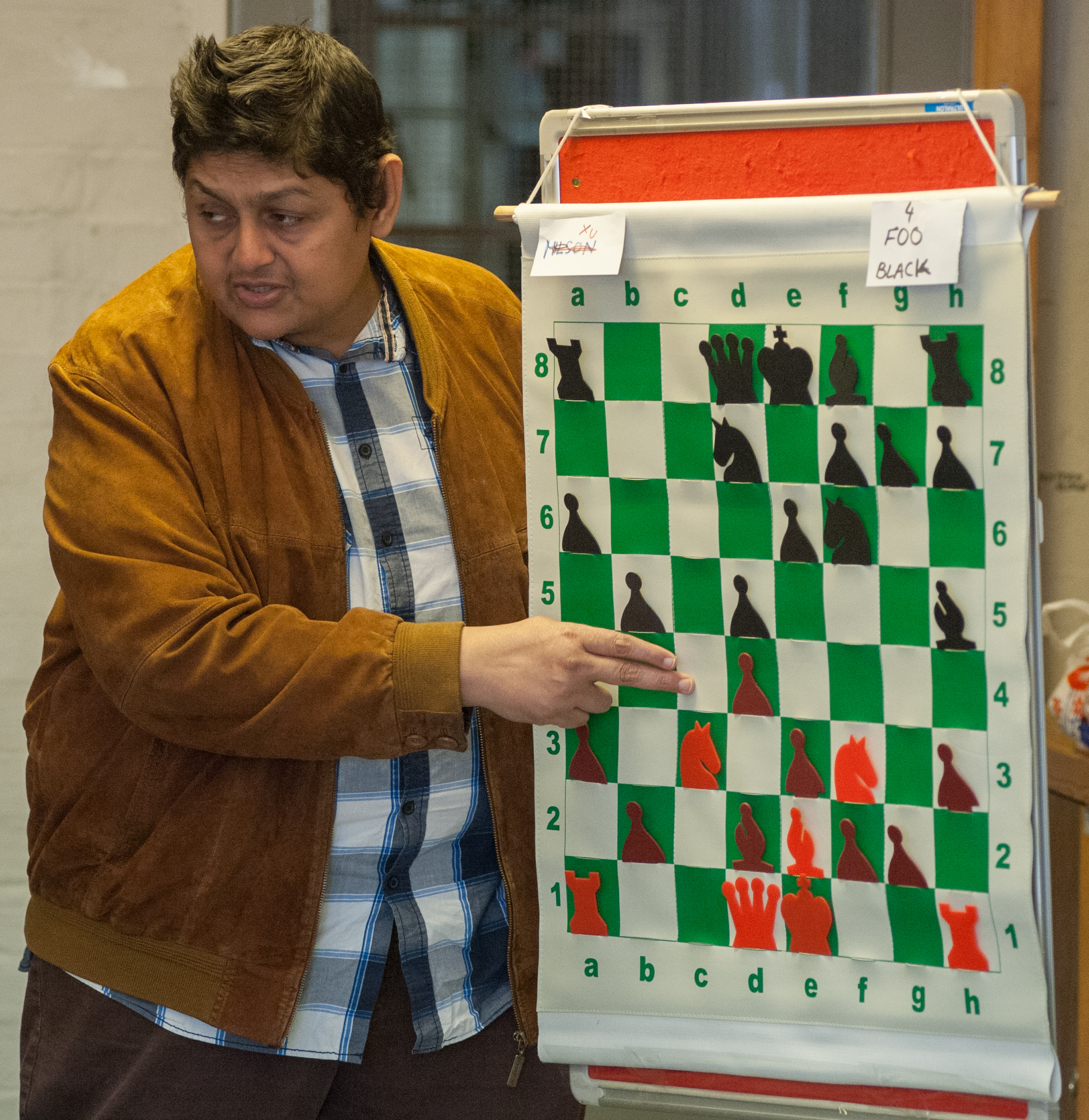
His earliest recorded game in Megabase 2020 was from the 3rd of September 1978 and was from the World Under-20 Championships in Graz, Austria. The event was won by Sergei Dolamatov and Ravi finished =25th on 6.5/13. The following year (Norway, 1979) Ravi improved to =12th with 7.5/13 and the title was won by Yasser Seirawan. James Plaskett was =3rd.
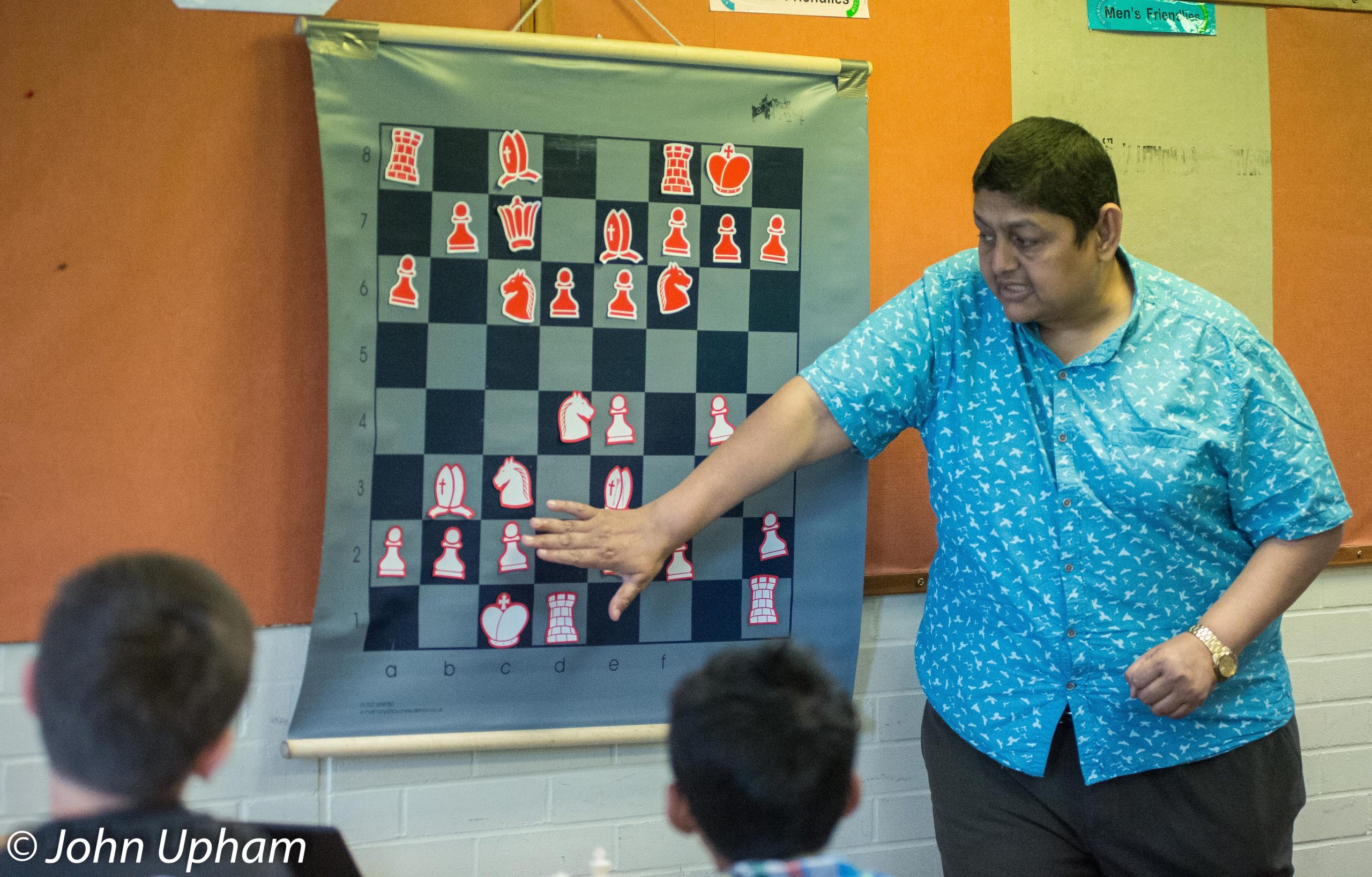
By now ( 1979) Ravi had graduated from The University of Madras with a degree in commerce and relocated to England seeking more playing opportunities. He played in his first Lloyd’s Bank Open in 1979.
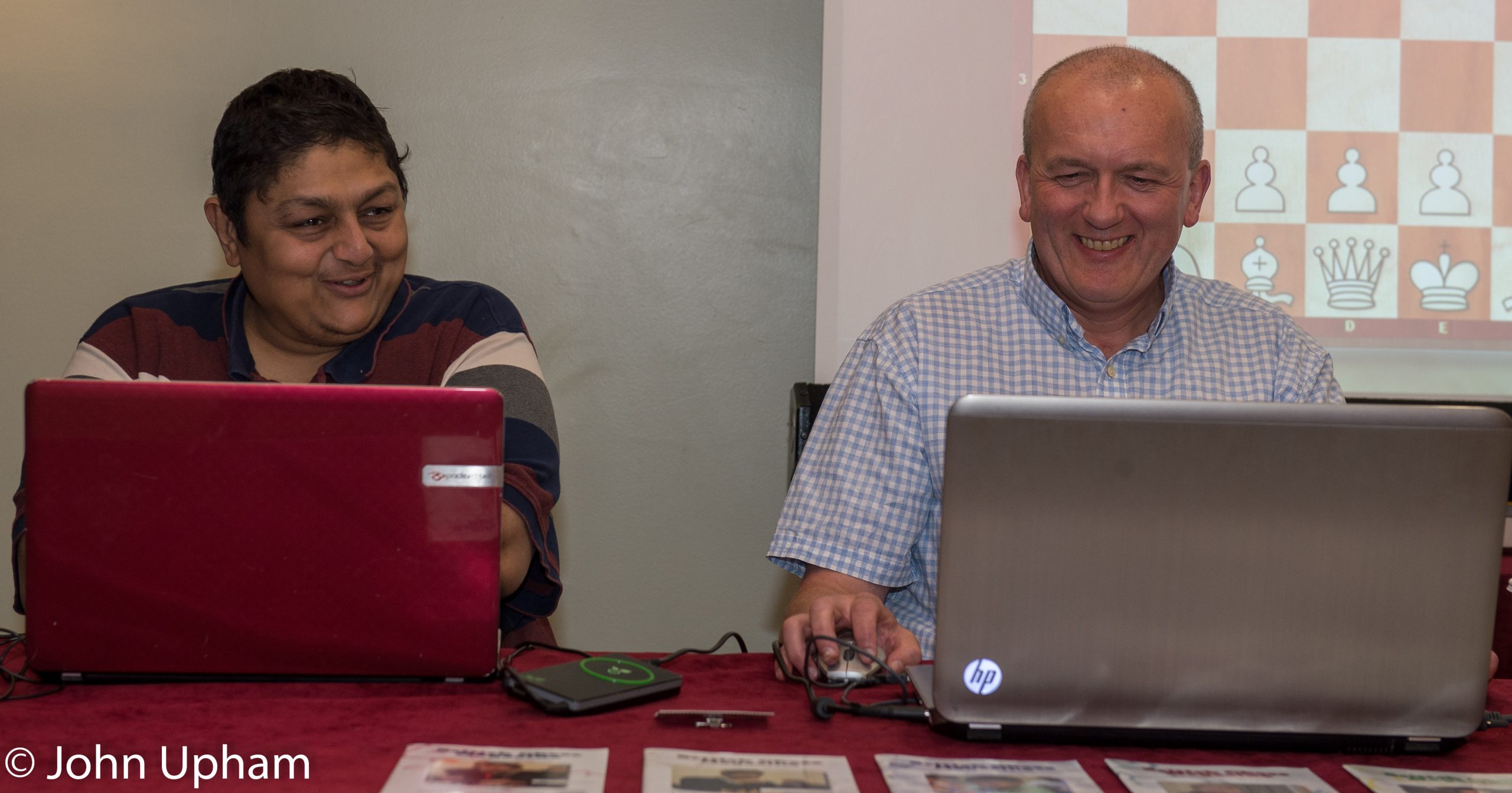
Ravi made his first appearance for India in an Olympiad at Valetta, Malta 1980. In 1981 he was runner-up to Bjarke Sahl in the 6th North Sea Cup followed by a creditable equal 10th in the 68th British Championships at Morecambe won by Paul Littlewood. In round eight he played this attractive game against Daniel King. Notes by PC Griffiths :
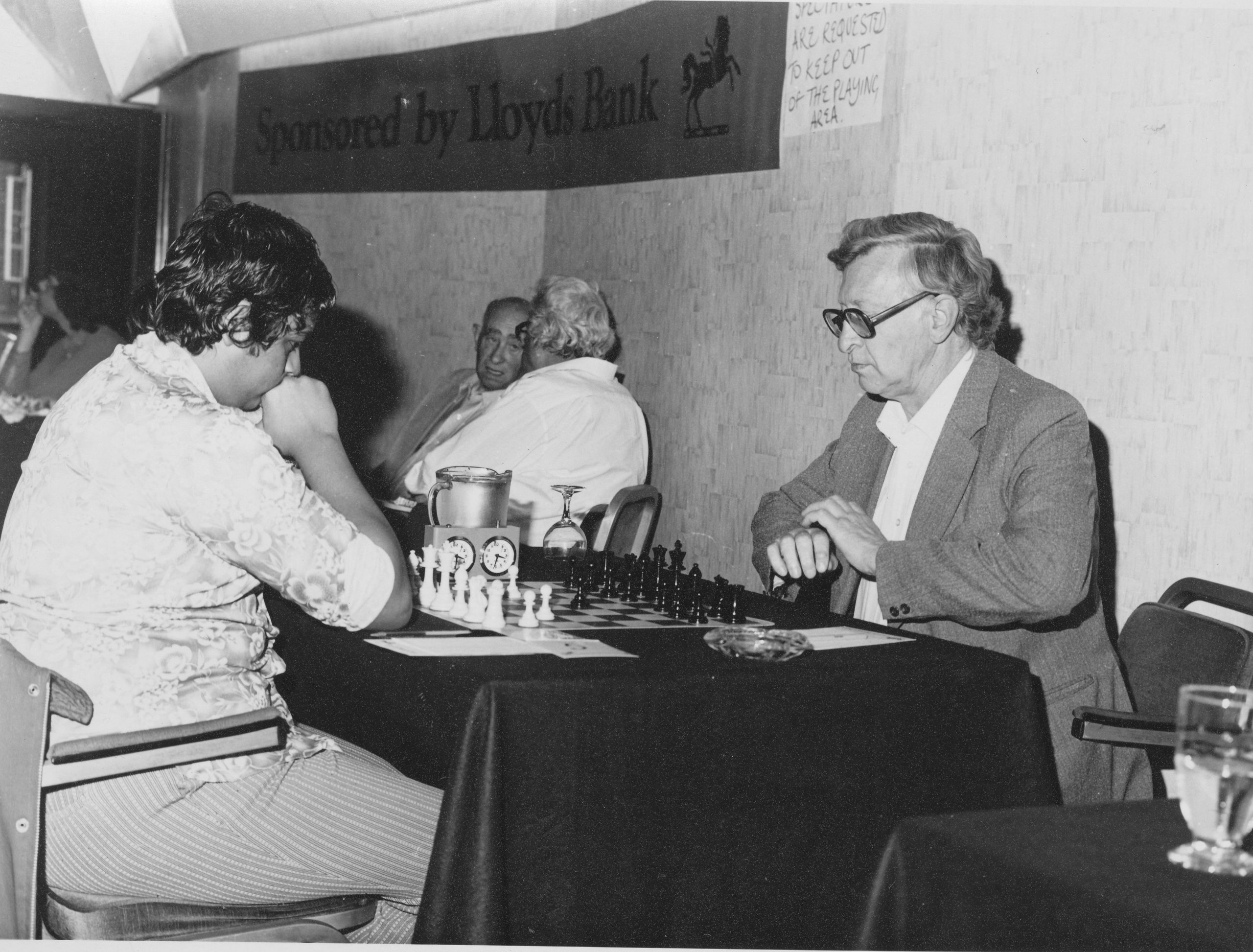
In 1982 Ravi scored a creditable =3rd at the 1982 British Championships (Mile’s year) in Torquay including wins over Basman, Muir and Plaskett :

1983 included an excellent win over James Tarjan at the Lloyds Bank Open but Danny King got revenge for his 1981 defeat!
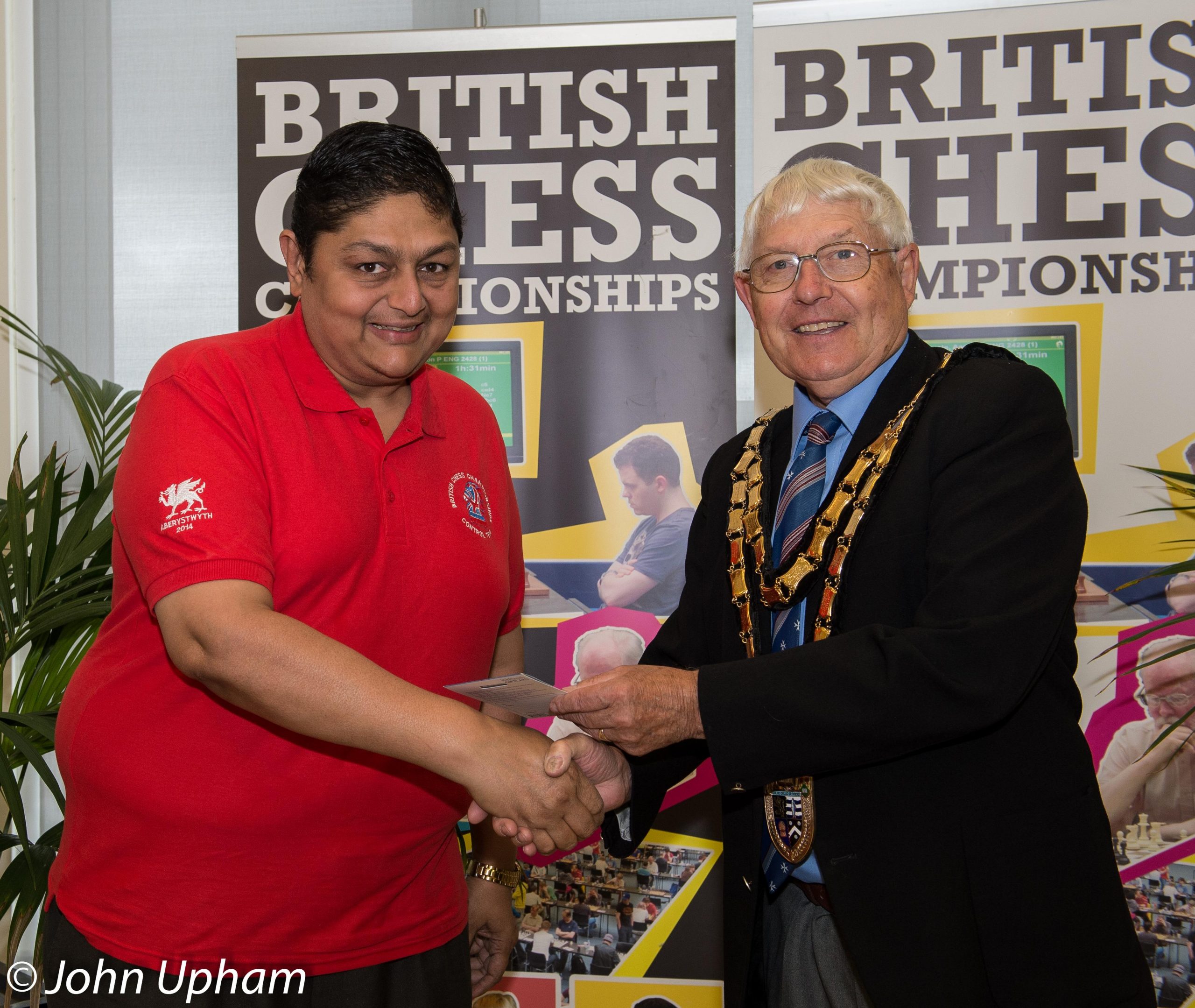
Ravi’s second Olympiad appearance for India came at Thessaloniki, Greece in 1984. This year provided Ravi’s highest FIDE rating of 2415 in January.
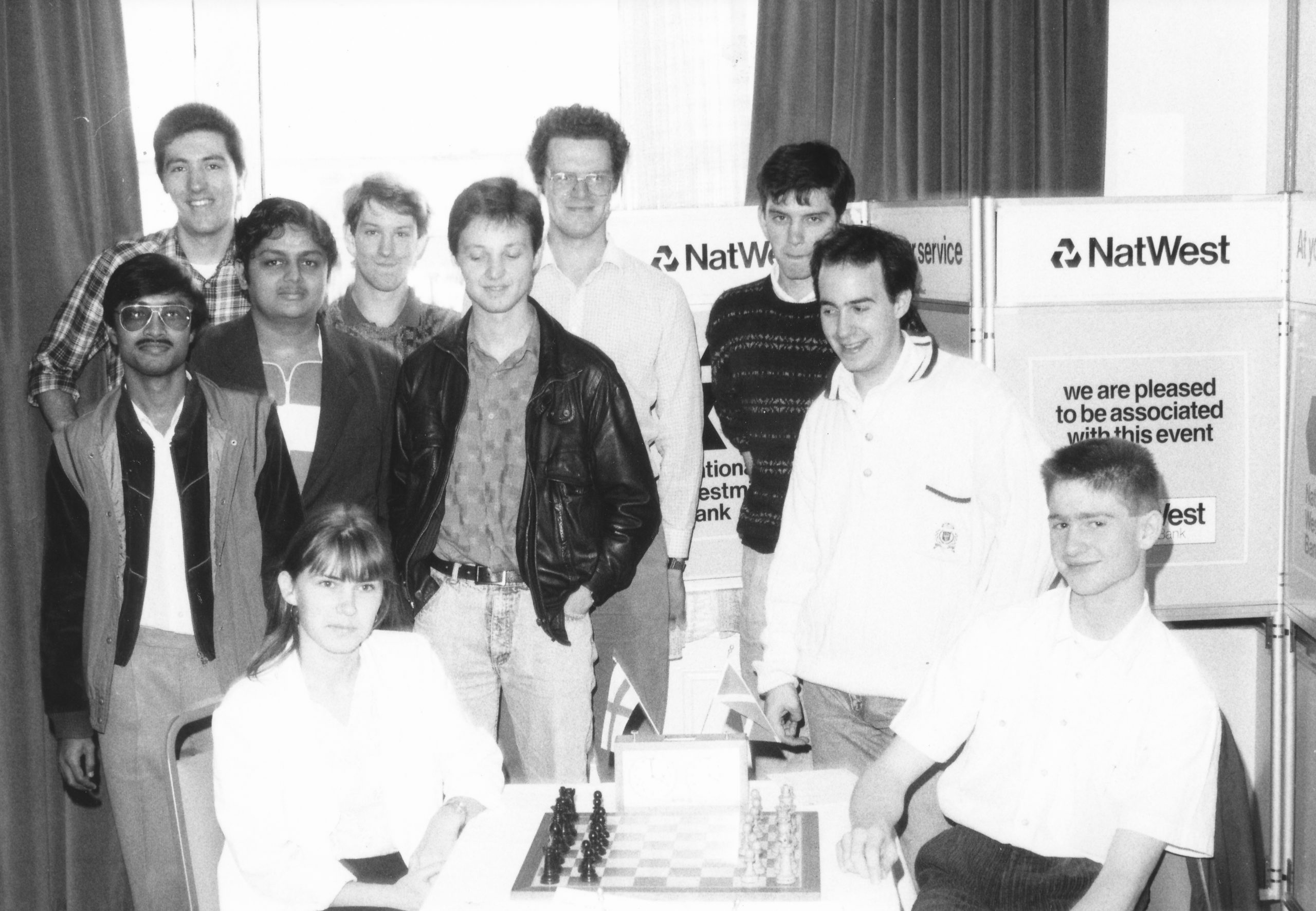
Ravi continued to be active as a player until 2000 when he started a career in coaching. He was the National Coach of the Emirates for eight years and has accompanied the ECF junior chess team to World Youth Chess Championships in 2014, held in Al Ain, UAE.
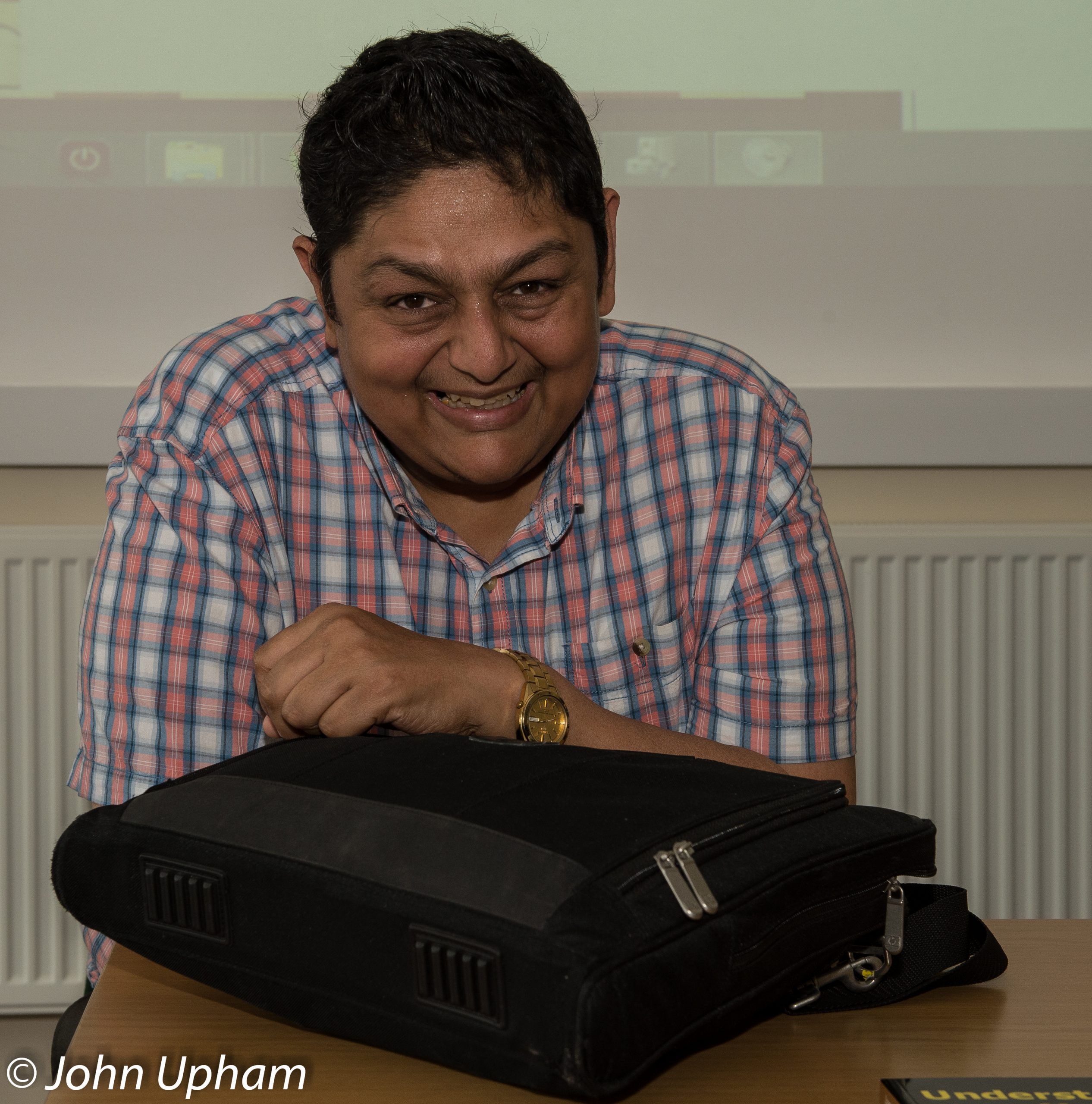
According to Spectrum Chess Calculation : “He is an experienced chess coach and provides chess coaching in 10 schools in Hertfordshire”
His first book was Karpov’s Best Games, Chess Check, 1984.
Following that Ravi wrote a biographical work on Ulf Andersson :
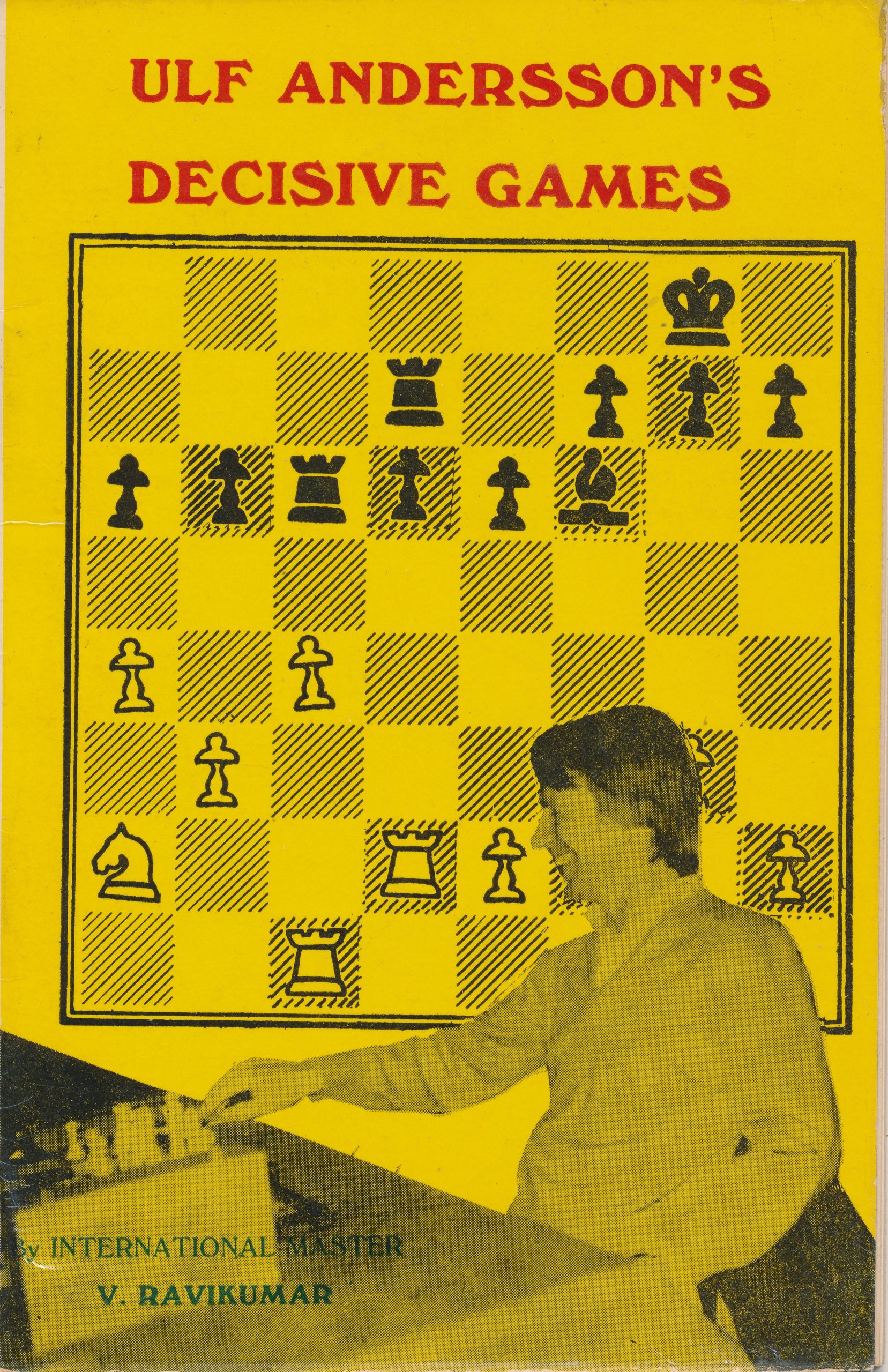
and then
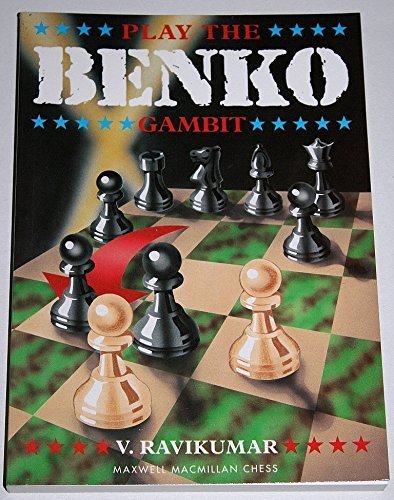
followed by
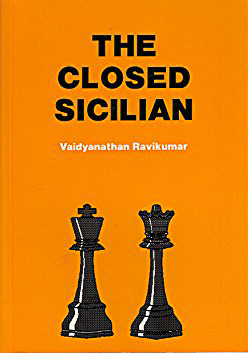
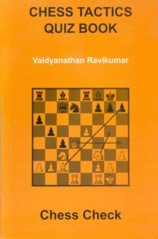
and most recently
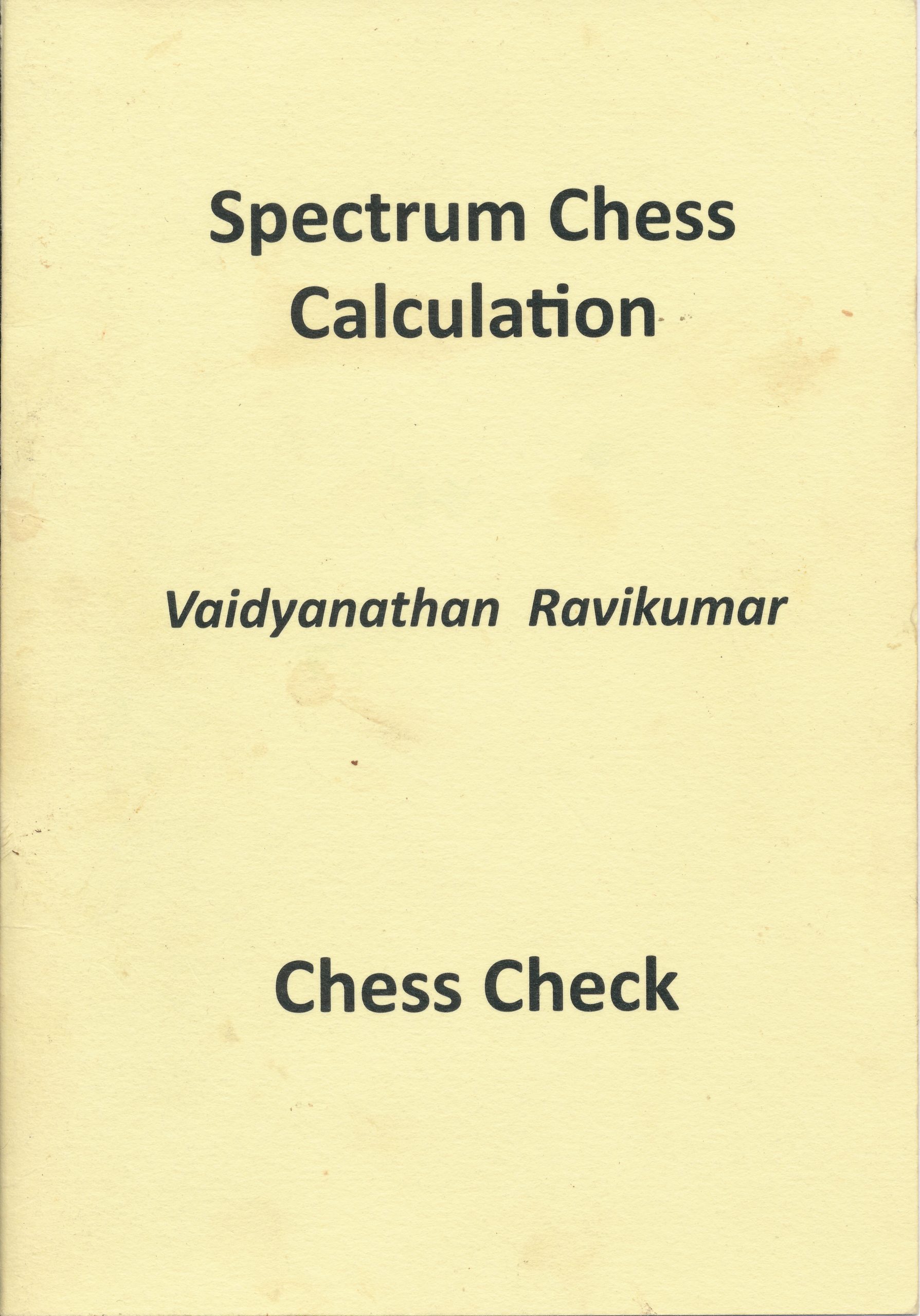
There were also works on Anatoly Karpov and Jan Timman as well as works on the Caro-Kann Defence.
Ravi is also India’s first vegan IM!
Seasons and Birthday Greetings to WIM Rita Atkins (25-xii-1969)
BCN wishes Happy Birthday (and seasonal greetings) to WIM Rita Atkins (25-xii-1969)
Rita Zimmersmann was born on Thursday, December 25th 1969 in Hungary.
She became a Women’s International Master in 1992.
Her peak FIDE rating according to Felice was 2225 in January 1998 aged 29, however according to MegaBase 2020 her peak rating was 2280 in July 1992 aged 23.
Rita has played for the Cambridgeshire CCA and 4NCL Blackthorne Russia.
Rita’s first recorded game in Megabase 2020 was runner-up the 5th Schoeneck Under-18 Girl’s Open with 5.5/7.
In 1990 she was =runner-up with 6/9 in the Aarhus Women’s tournament.
She was =1st in the Budapest Women’s IM tournament securing a norm.

In 1992 she became Hungarian Women’s champion with 8/11 :
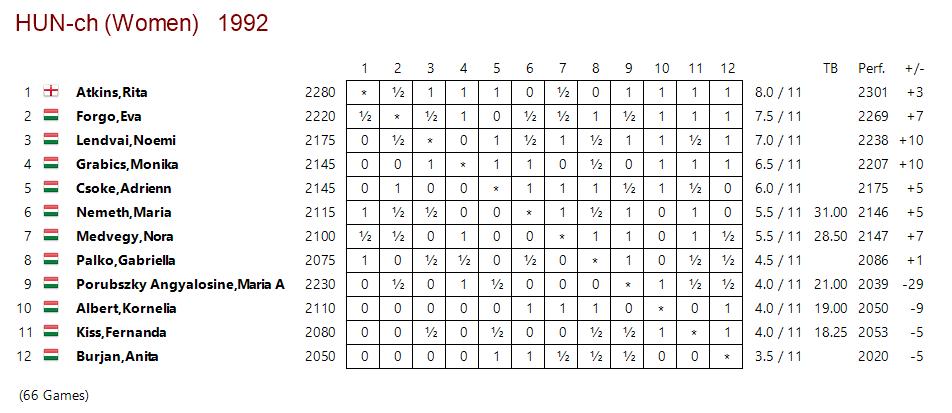
With the white pieces Rita both 1.e4 and 1.d4 playing open Sicilians, the Trompowsky Attack and the Accelerated London System.
As the second player she plays the Sicilian Four Knights, the Modern Benoni and recently, the Czech System.
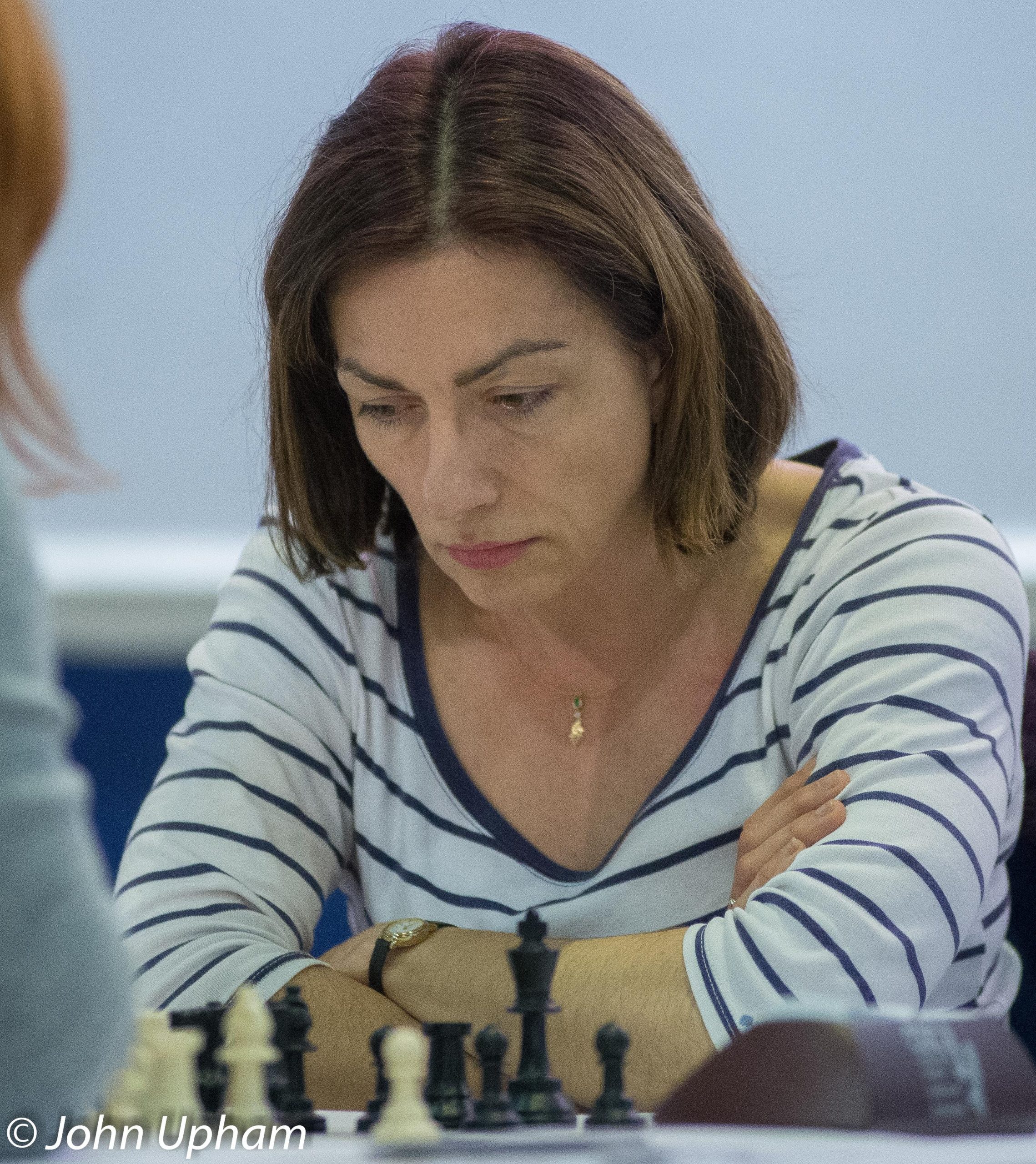
In 1997 Rita relocated to England and played in her first 4NCL weekend for Slough. She married IM Michael Hennigan and settled in London.
By 2014 Rita had transferred to Blackthorne in the Four Nations Chess League and had become Rita Atkins.
In the last few years Rita has become active in the field of chess education and has combined her interests of mathematics and chess especially in the teaching of children. She has presented at various London Chess Conferences and works with John Foley within ChessPlus.
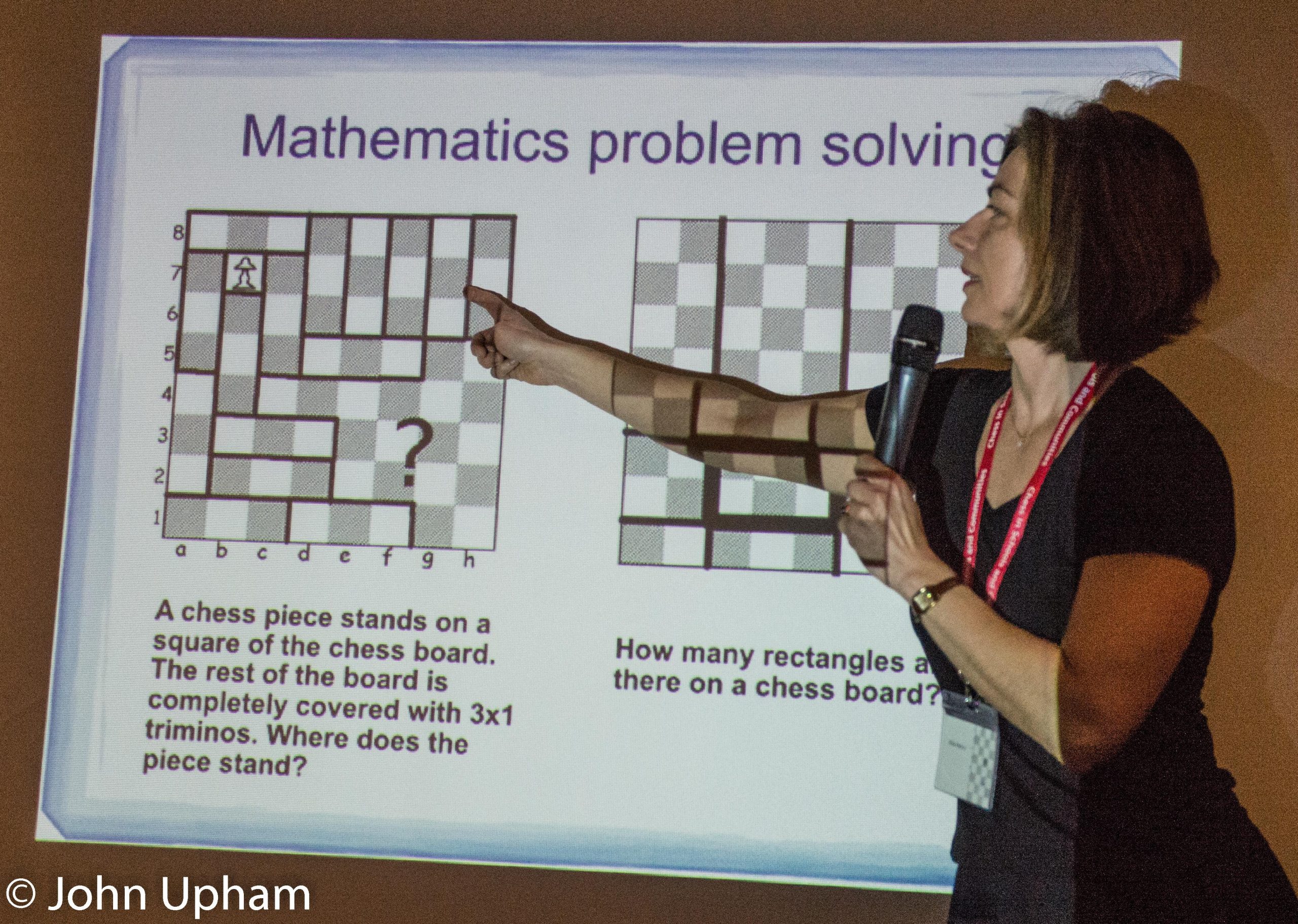
On December 24th 2023 an interview with ChessBase News was published entitled
“Rita Atkins: “Gender stereotypes are changing, but they are changing slowly”
Happy Birthday IM Graeme Buckley (25-xii-1971)
BCN sends best wishes to Graeme Buckley on his birthday.
Graeme Noel Buckley was born on Saturday, December 25th, 1971 in Wolverhampton, West Midlands.
His first chess club was Bushbury which is also known as Bilston Sports & Social Club Ltd. His father David is the long time club President.
Graeme’s first recorded games in Megabase 2020 were at the 1987 British Championship in Swansea were he scored a modest 4/11.
Graeme married IM Susan Lalic in Sutton, Surrey in 2001 and they reside in Sutton. They have two daughters, Lucy and Emma who attend Nonsuch High School for Girls following in the footsteps of their mother.
Graeme became a FIDE Master in 1994 and an International Master in 1995.
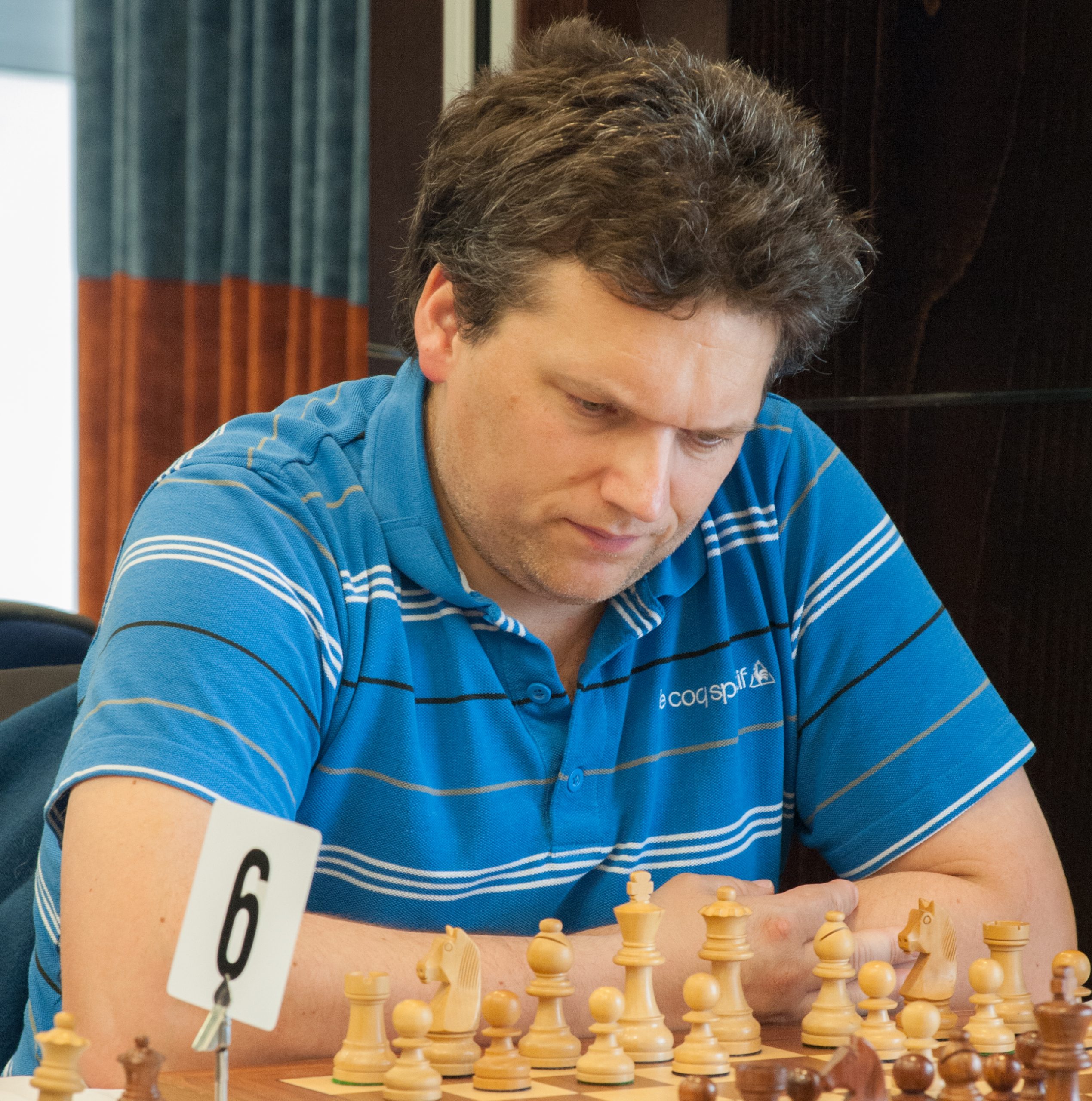
He has played for Midland Monarchs and Wood Green in 4NCL, Surrey CCA, Wimbledon 4NCL Guildford and Bushbury (in Wolverhampton)
According to ChessBase Graeme reached his highest FIDE rating in July 2003, aged 32 of 2420.
Graeme teaches chess in many Surrey Schools and in conjunction with Susan.
Graeme has been a director of Surrey County Chess Association for four years resigning in 2011.
Graeme was Southern Counties (SCCU) champion for the 2009-10 season
According to Easy Guide to the Queen’s Gambit Accepted, Cadogan, 1998 :
“Graeme Buckley caused a stir in his first year as a professional player securing his International Master title in a matter of months, quickly followed by his first grandmaster norm. More recently he has been involved in some major coaching projects. In 1996 he was manager of the English youth team, who achieved the impressive double of winning both the Glorney and Faber Cups.”
With the white pieces Graeme playa the Queen’s Gambit nowadays with Nf3 appearing before c4 having flirted with the Trompowski in the early days.
As the second player he plays the Sicilian Scheveningen, the King’s Indian and not the Queen’s Gambit Accepted despite authoring a book about it!
Following this article a comment was made by a BCN reader as follows:
Mr Buckley taught me chess as a child. If there is any way he might see this post, I want to thank him for instilling a love of the game that has lasted to this day. A fine player and a great man. Thank you IM Buckley from the bottom of my heart.
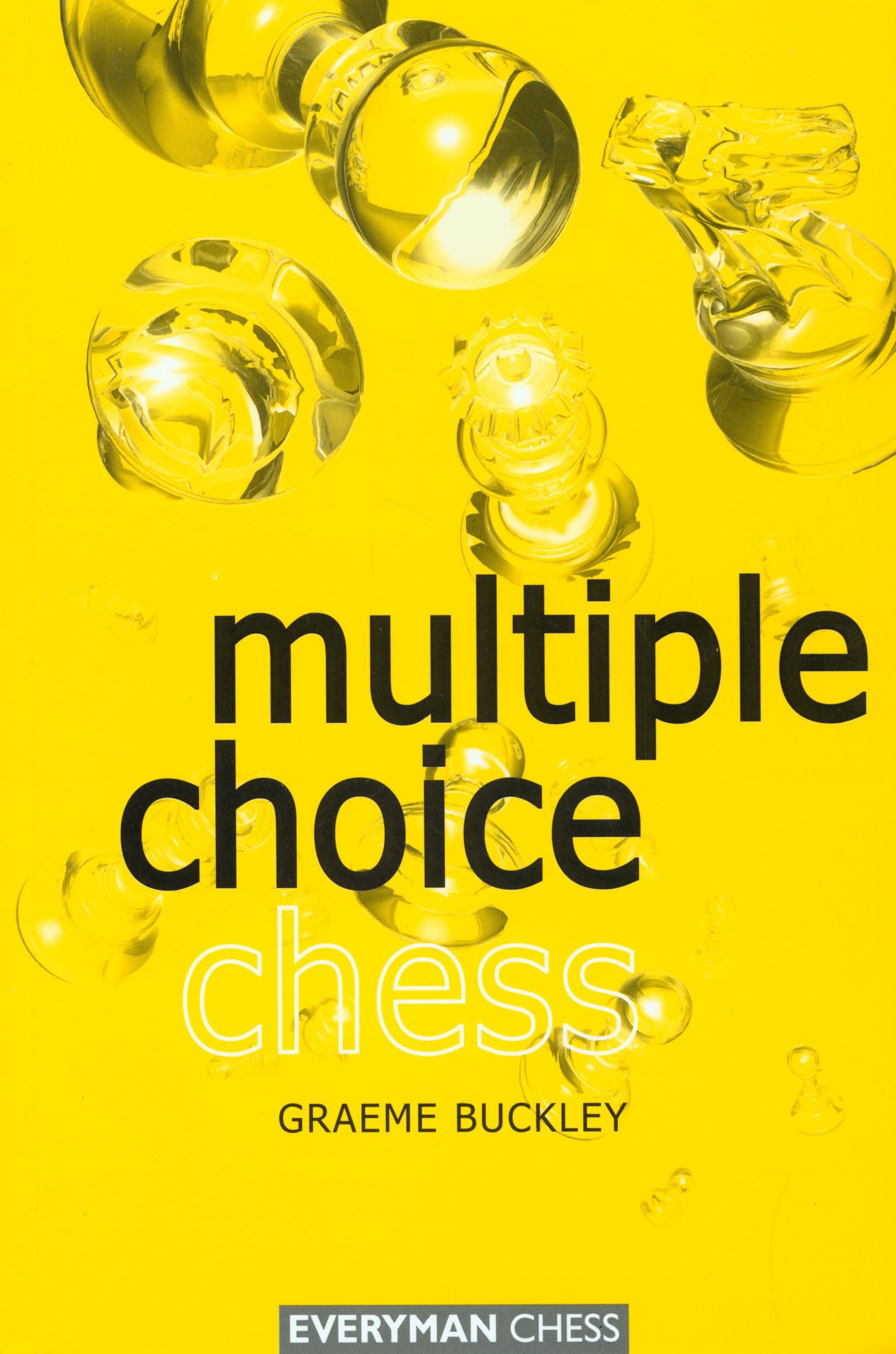
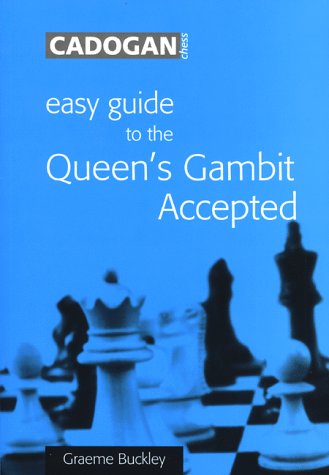
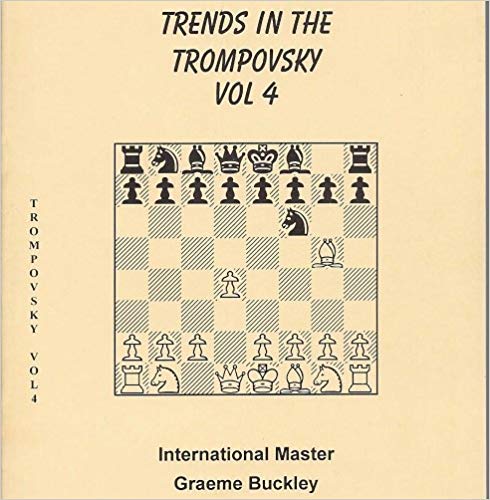
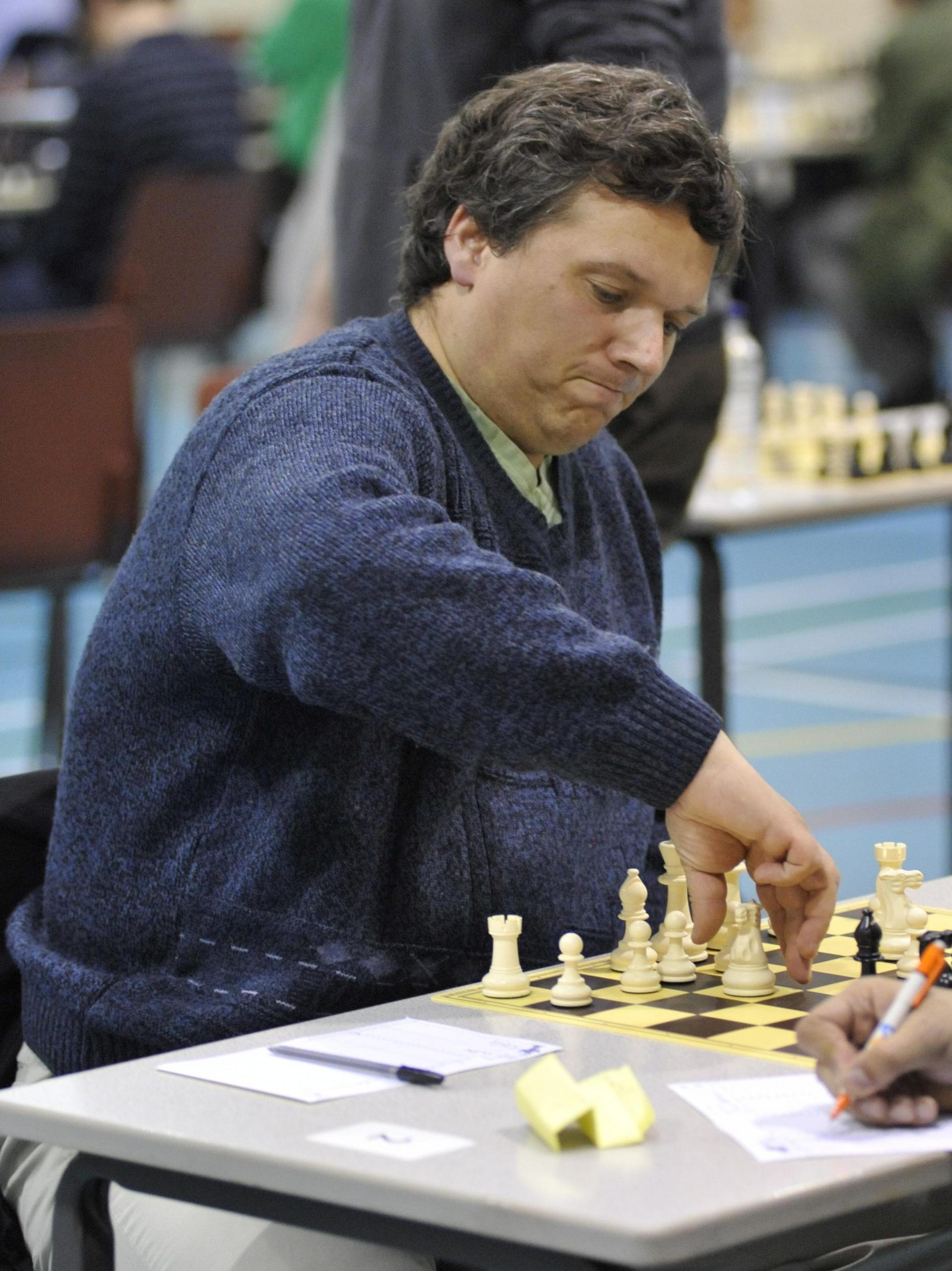
Remembering David Pritchard (19-x-1919 12-xii-2005)
We remember David Pritchard who passed away on Monday, December 12th, 2005.
David Brine Pritchard was born on Sunday, October 19th, 1919. On this day the first US Distinguished Service Medal was awarded to a living female recipient, Anna Howard Shaw.
He was born in Wandsworth taking his mothers’ Winifred maiden name of Brine (as was customary in those days). His father was Arthur Pritchard (DoB : 4th January 1890) and he was the managing director of an Engineering Company. Arthur and Winifred married in Maidenhead, Berkshire in 1917.
At the time of the 1939 census David was a chiropodist and recorded as single and living in Munee Cottage, Main Street, Bedford. Main Street appears to have been renamed to Main Road which is in Biddenham. It is likely DBPs cottage was something like :
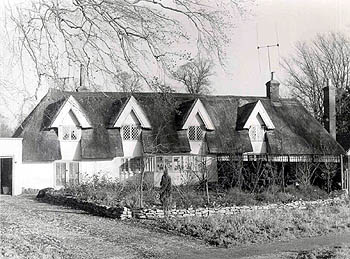
During the second world War David joined the Royal Air Force and was stationed in the Far East and following the war, he switched to intelligence work also for the RAF. He attained the rank of Squadron Leader and played much chess during this period of his life.
In 1950 David completed his first book : The Right Way to Play Chess, Elliot Right Way Books, 1950, ISBN 1-58574-046-2
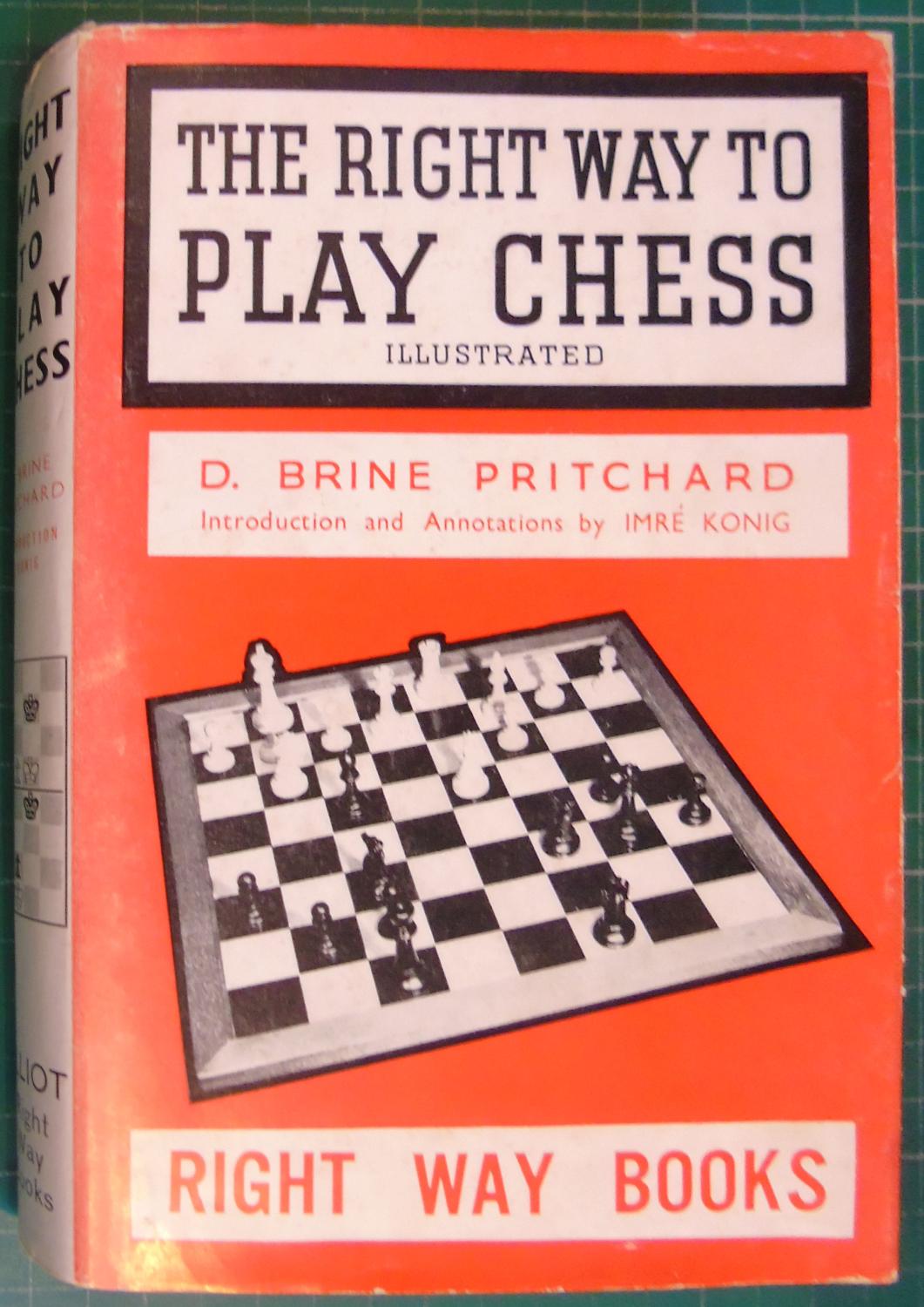
(Ed : This was the first chess book of this article’s author and was thoroughly consumed!)
On page 224 of said book David wrote :
Chessplayers – and this must be whispered – are generally an egotistical, ill-mannered crowd. If they conformed to common rules of decorum these words would not have to be written
followed by
I once carried out a private survey at a well-known chess restaurant where a large number of ‘friendly’ games are always in progress. In less than 30 per cent of those observed was resignation made with a good grace. In two-thirds of the games the loser either knocked his king over, abruptly pushed the pieces into the centre of the board, started to set up the men for a fresh game, or got up and walked away without saying a word to his opponent.
He married Elaine Saunders in between January and March of 1952 in the Cheslsea Registry Office.
Elliot Right Way Books was an excellent choice of publisher for David and only 36 minutes by car from his new home in Godalming.
He won the Singapore Championship in 1954 and the Malaysian Championship in 1955.
Visiting https://www.chesshistory.com/winter/winter97.html you will find two images of David and Elaine playing chess in Singapore.
David and Elaine had a daughter, Wanda on March 21st 1958. She became Wanda Dakin who was also a successful chess player. Wanda attended Guildford High School for Girls and then Royal Holloway College, Egham.
David was Southern Counties (SCCU) champion for the 1958-59 and 1965-66 seasons.
From the British Championships, 1959 in York we have this sparkling game with Frank Parr :
By now David had developed an interest in chess variants and board games in general.
David was the Chairman of the organising committee for the Battle of Britain Chess Tournament: he was runner-up in the first year to RF Boxall.
In 1970 he brought out his third book : Begin Chess, David Pritchard, Elliot Right Way Books, 1952
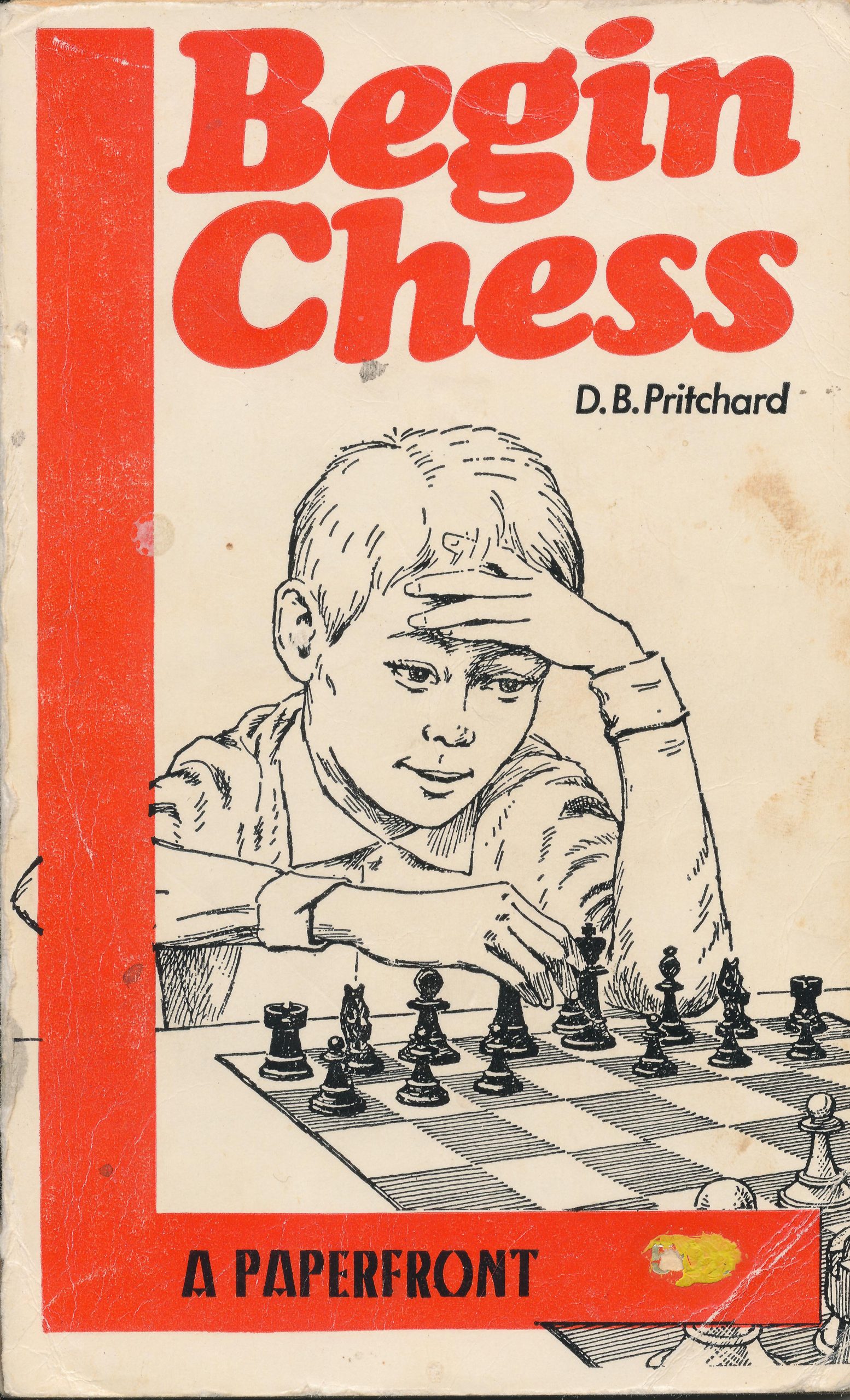
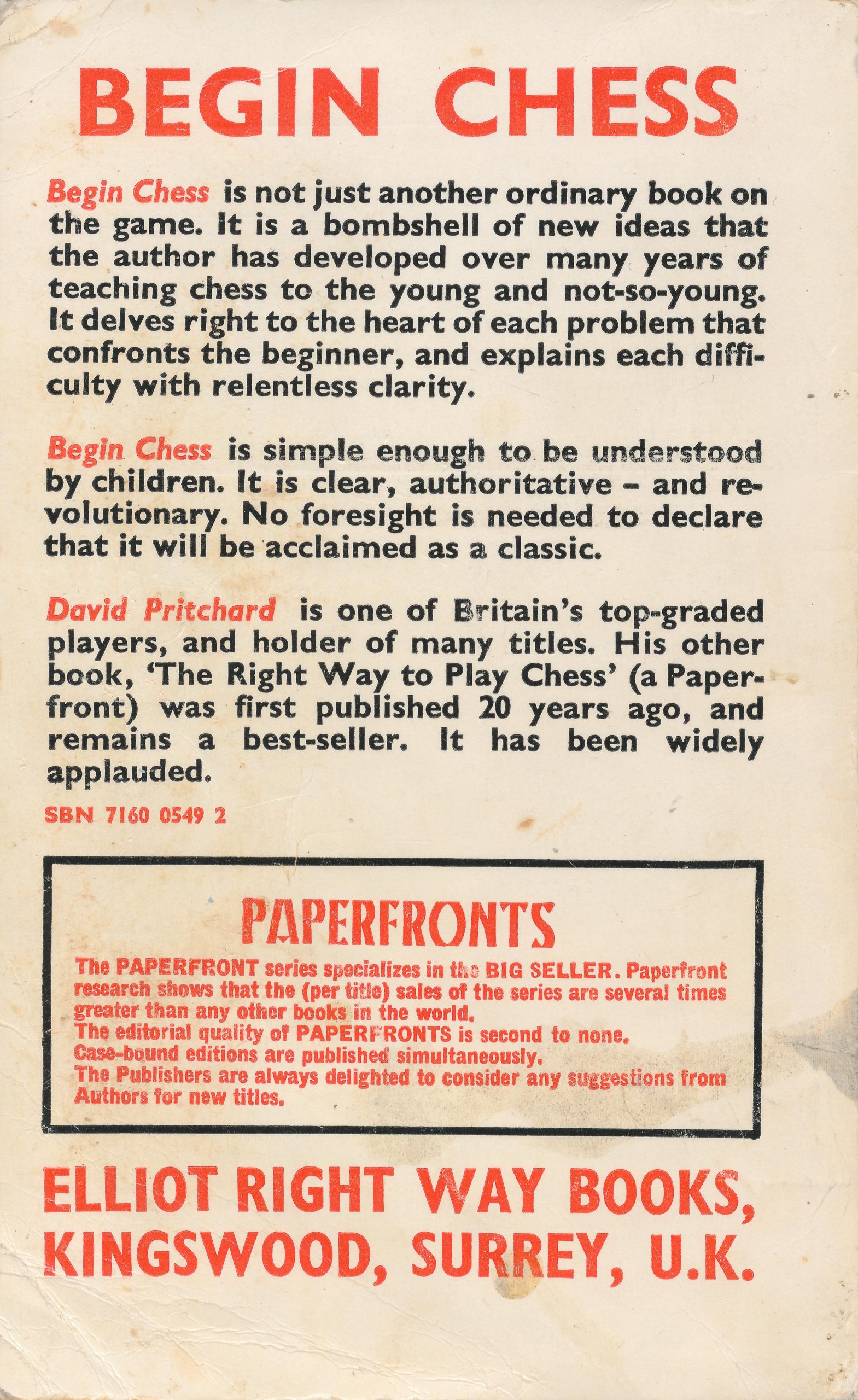
David became President of British Chess Variants Society and wrote many books on variants and indoor games.
Here is an interview compiled by Hans Bodlaender about David’s Encyclopedia of Chess Variants :
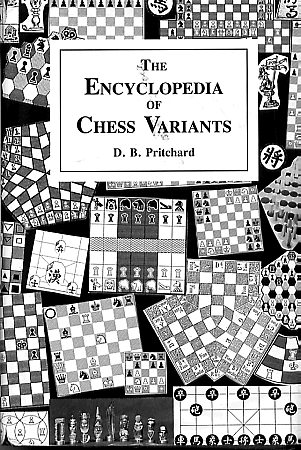
Particularly interesting was this Q&A :
Do you think computers and the Internet will have effect on chess and on chess variants? If so, in what way?
I think that the Internet will inevitably introduce chess to more players but I forsee chess variants, because of their novelty, benefitting in particular from publicity on the net. I expect variants to gain more and more adherents in the future.
David was preparing a second edition before he passed away. This was completed and made available on-line by John Beasley.
The Pritchard family lived at Badgers Wood, Hascombe Road, Godalming, Surrey, GU8 4AA in an idyllic location :

and here is the exceptional interior with games room :

At the time of his passing he had five grand children.
From British Chess Magazine, Volume CXXVI (126, 2006), Number 2 (February), page 76 :
“David Brine Pritchard (19 x 1919 Streatham, London – 12 xiii 2005, London) has died following a fall . He was a strong amateur player and a successful author of books on chess and other games.
David Pritchard was a Squadron Leader in the RAF during the war and later rejoined it to work in intelligence. Whilst serving with the RAF he won the Malayan Chess Championships in 195, and he was also instrumental in the running the UK event known as the Battle of Britain Tournament which attracted a strong field in its heyday and generated revenue for the RAF Benevolent Fund.
He was a dangerous attacking played who scored a number of notable scalps in the British Championship including Penrose and Miles, without ever achieving the consistency required to challenge for the leading positions. He won the Southern Counties championships in 1959 and 1966.
As an author, Pritchard’s most successful book was The Right Way to Play Chess (Elliott, 1950, with numerous reprints), which is still to be found for sale in many British bookshops.
He will also be remembered as a leading authority on chess variants: he was reported to be in the process of preparing a second edition of The Encyclopedia of Chess Variants (1994) at the time of his death. He was also a very good correspondence player, an inventor composer of chess puzzles of all sorts (some of which appeared in BCM) and his interest in Fairy chess dated back to the 1940s.
His wife Elaine Pritchard, the leading woman player of the 1950s and 1960s, and their daughter Wanda (who also played competitive chess) survive him. We send them our condolences on behalf of BCM and its readers.”
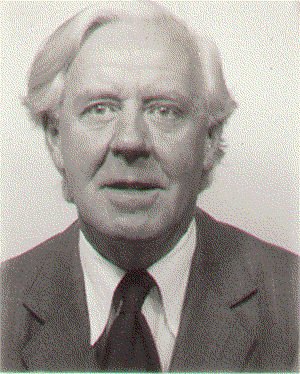
He was a leading member of Godalming Chess Club and played in the Surrey Border League. The David Pritchard Shield was presented in his memory.
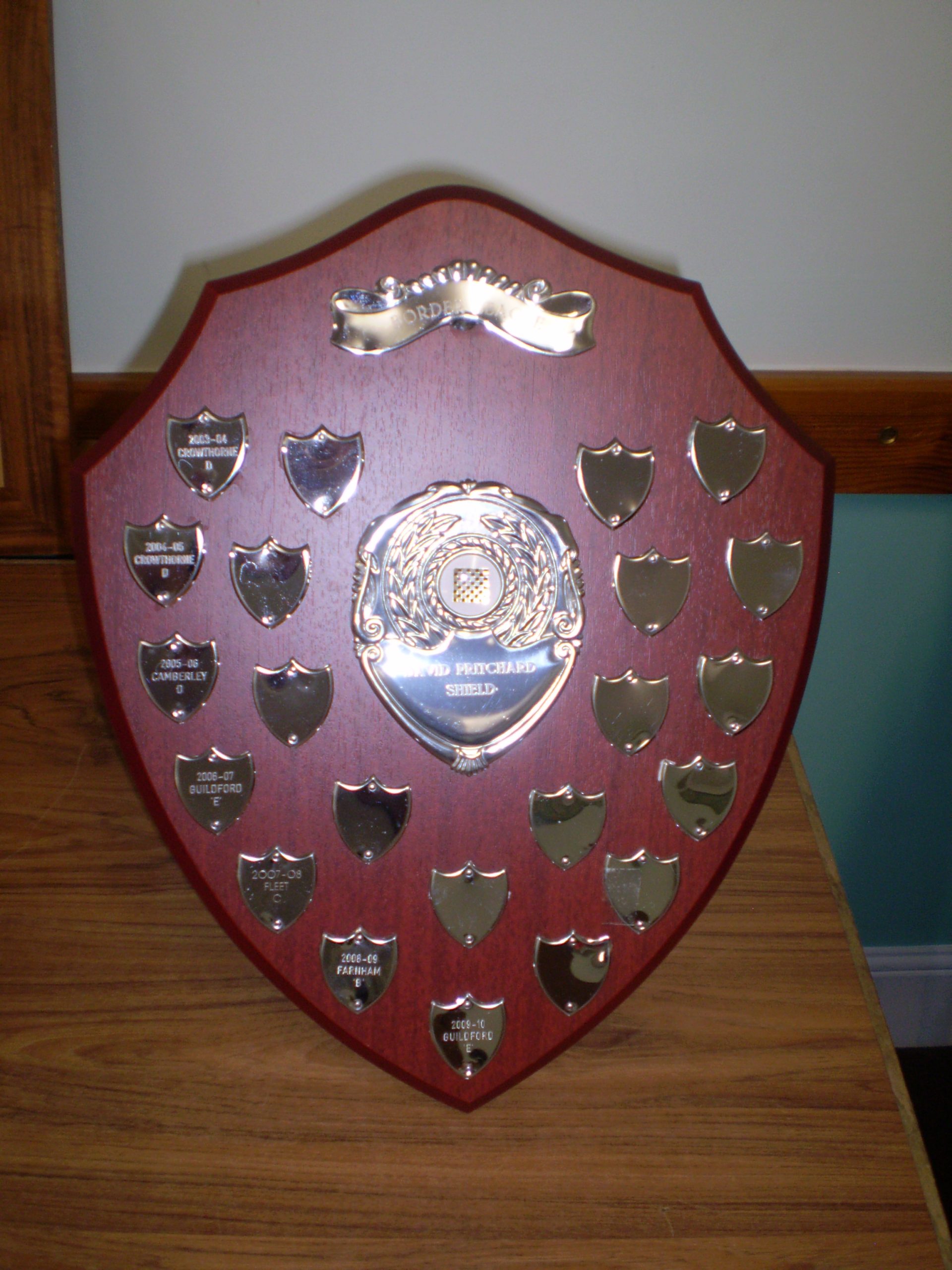
Here is David’s Wikipedia entry
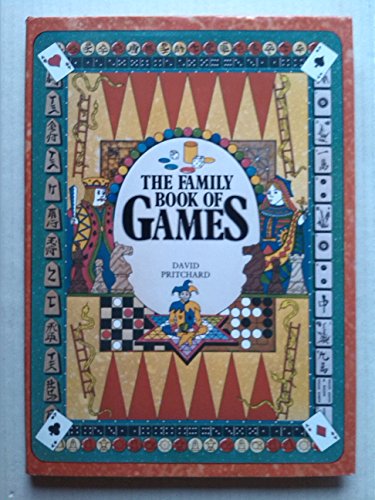
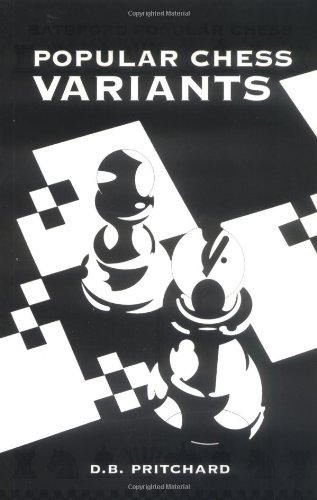
Remembering Joseph Blake (03-ii-1859 11-xii-1951)
We remember English player Joseph Blake who passed away on Tuesday, December 11th, 1951.
Joseph Henry Blake was born on Thursday, February 3rd, 1859 in Farnborough, Hampshire. His parents were Joseph Denner and Eliza Blake (née Early). In 1871 Joseph (aged 12) had a brother Frank (aged 10), sisters Annie (8), Elizabeth S (7), Eliza E (1) and a servant, Kate Longman aged 18. The family lived in Lydia Cottage, Hewitts Road, Millbrook, South Stoneham, Hampshire.
According to the 1861 census Joseph was two years old and living with his parents and Frank in Rotten Row, Yeovil, Somerset.
In 1881 the family has upped sticks again and moved to 2 St. Lawrence Road, Saint Mary, Eastleigh, Hampshire. This address is also given as the South West Telegraph Office. Eliza was now the head of the household and a widower. Apart from Eliza E aged 11 everyone worked for the railway.
In 1891 Joseph had become Head of the Household (aged 32) and they had acquired a servant (Anna M Cornell) and a blacksmith (Francis Cornell) from Braintree in Essex.
In 1900 Joseph married Alice New in Cheltenham, Gloucestershire. They lived at 24, Barton Road, Eastleigh, Hampshire. Tragically, Alice passed away in 1903.
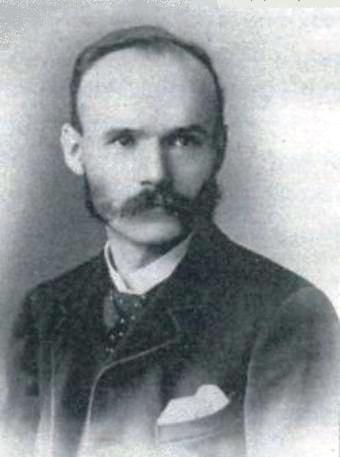
By 1911 Joseph was 52 and had retained his career as a Railway Clerk. He lived at 33, Broomfield Road, Tolworth, Surrey :

He is recorded as the head of a household of one and a widower.
In 1939 Joseph was living at 10 Springfield Court, Springfield Road, Kingston Upon Thames, Surrey. He was now retired.
No doubt there would have been other addresses not captured by the census records.
According to The Encyclopedia of Chess, (Batsford, 1977), Harry Golombek OBE :
“A leading British player in the 1890s and for many years editor of the Games Section of the British Chess Magazine between the two world wars. Blake’s best tournament performance came at the age sixty-three when, at Weston-super-Mare in 1922, he came 1st ahead of Maróczy, Kostić, Sir George Thomas and Yates.
The remarkable feature about Blake’s chess career is that he retained his skill and his comprehension of the game for a much longer period that most chess players. This extended from 1887 when he was 1st at the Counties Chess Association tournament at Stamford ahead of Bird and Pollock, a performance he was to repeat in 1891 at Oxford, to 1909 when he tied with H. E. Atkins for first place in the British Championship, to 1923 when he won the Weston-super-Mare tournament, right into the 1930s when he was principal annotator for the British Chess Magazine.”

and according to The Encyclopedia of Chess (Robert Hale, 1970 & 1976), Anne Sunnucks :
“One of the leading British players at the end of the last century and the beginning of the present century. Born on 3rd February 1859. Represented England in the Anglo-American cable matches in 1902 and 1909. His best results were 1st in the Counties’ Chess Association Tournament 1887, ahead of Bird and MacDonnell; =1st with HE Atkins in the 1909 British Championship, but lost the play-off for the title; 1st at Weston-super-Mare 1922 ahead of Maroczy, Kostich, Sir George Thomas and Yates, and winner of the brilliancy prize for his game against Sir George Thomas; 2nd in the international correspondence chess tournament organised by Le Monde Illustre in 1895.
Blake was President of the Southern Counties Chess Association in 1911 and President of the Hampshire Chess Association from 1910-1912 and from 1927-1929. He was also Hon. Secretary of the City of London Chess Club for some years.”
According to Tim Harding in the excellent Correspondence Chess in Britain and Ireland, 1824-1987 :
Railway clerk Joseph Henry Blake, the leading English correspondence player of the 1890s; also a strong OTB amateur player. He was a regular contributor to British Chess Magazine from the 1880s to the late 1930s.
In British Chess Magazine, Volume XXXIX (39, 1919), Number 3 (March) we have the following from Julius du Mont : “I presume it relates more particularly to chess professionals in this country, at any rate, it does not seem to me that the jews hold rank amongst first-class amateurs in proportion to their numbers.
In London there are very few if any of the class of RC Griffith, GA Thomas, JH Blake, HG Cole, EG Sergeant, and many others to say nothing of the younger recruits , W.Winter and RHV Scott.”
From the 1949 British Chess Magazine (written by RN Coles) we have this :
JH Blake is Ninety
After an absence of ten years I looked in recently on the Kingston and Thames Valley Chess Club. There were many new faces and a number of familiar ones, among the latter one of rosy countenance, trim beard and twinkling eyes, none other than JH Blake, more vigorous than ever and attaining his 90th birthday on the 3rd February.
Twenty years ago in this same club I (RN Coles) was learning the game, now middle age approaches. Blake was an elderly man in those days, who had retired from all competitive play because of the strain it imposed; now, so far from showing the weight of years, he is back in competitive chess again. He won the club championship last year and is in a fair way to repeating his victory this year. Of all the ‘Grand Old Men’ of chess, few have still been champions in their 90th year.
Older readers of the BCM will remember him as their Games Editor for many years, but few memories will cover the whole series of his successes beginning with a 1st at Stamford in 1887. Even 1922 must seem a distant year to the generation of today. That was the year that Maroczy and Kostic were invited to Weston-super-Mare to meet such rising young English masters as FD Yates and Sir George Thomas. And the first prize amongst those talented players was won by JH Blake, who had been born just when Morphy returned to England after his Paris Victory over Anderssen !
All readers of the BCM and all players everywhere will wish Britain’s oldest master continued health and increasing vigour, and those who knew him today will be surprised if he does not continue his attack for another decade at least.
Besides winning the first prize at Weston Blake also won the brilliancy prize with the following game : (#10,229)
British Chess Magazine, Volume LXXII (72, 1952), Number 2 (February), pp.44-46 contained an obituary with articles from MDB* :
*(Careful investigation by Richard James suggest that MDB is Mabel Dorothy Barker, JHB’s niece in 6th Cross Road.)
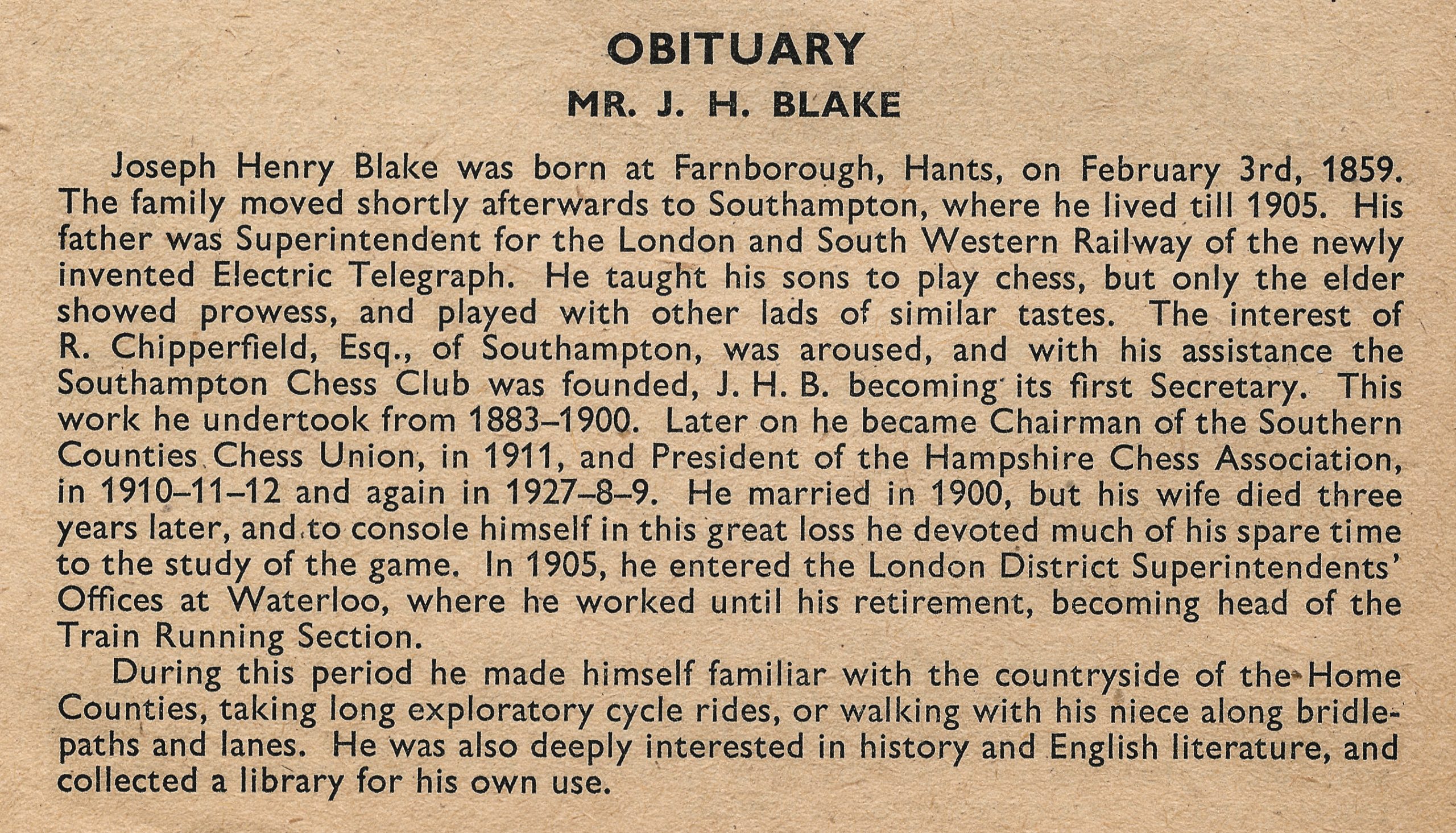
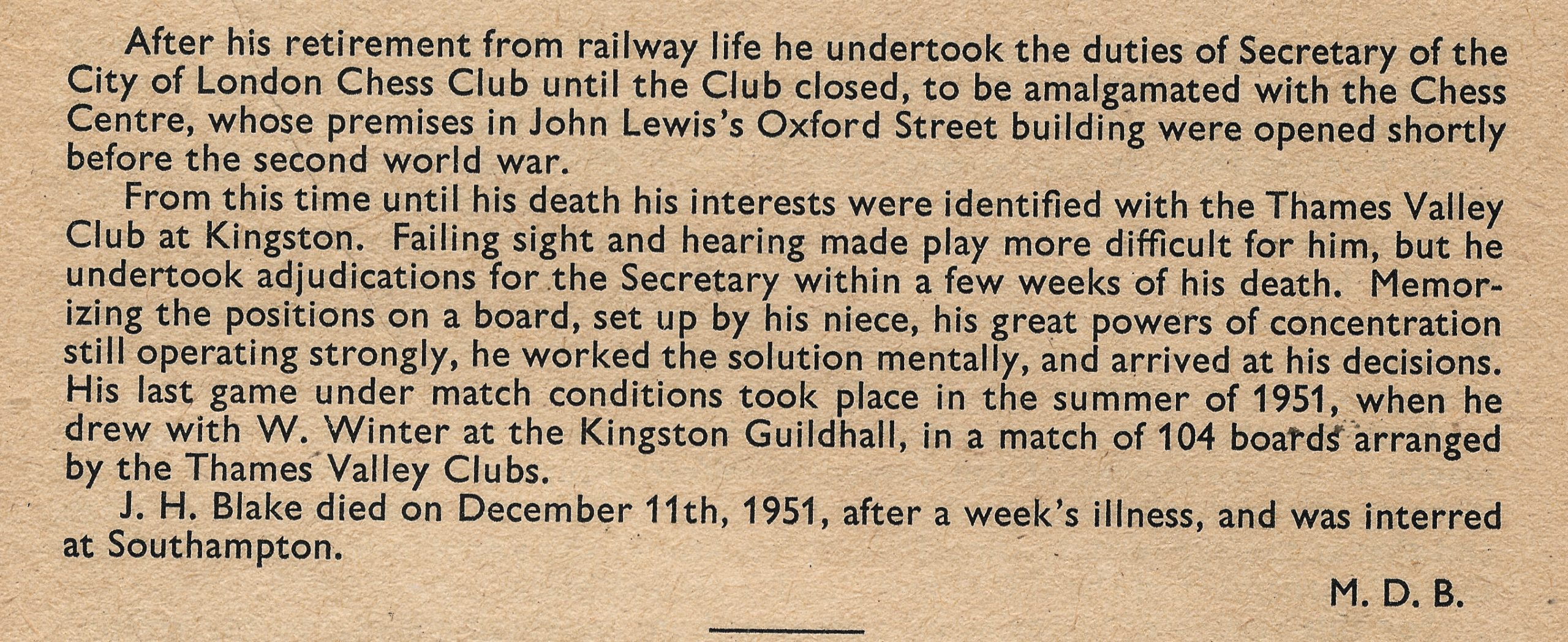
and EG Sergeant :
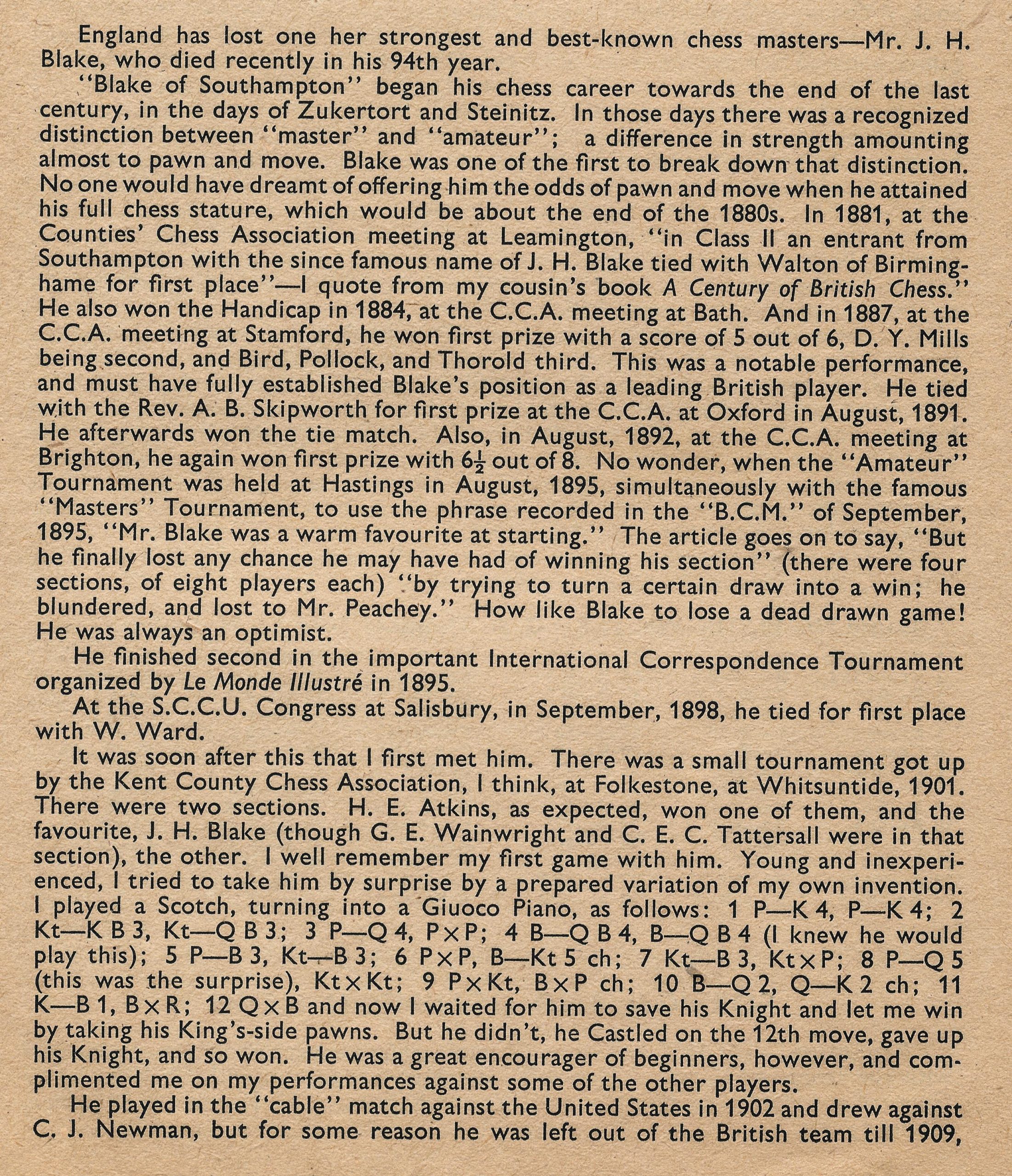
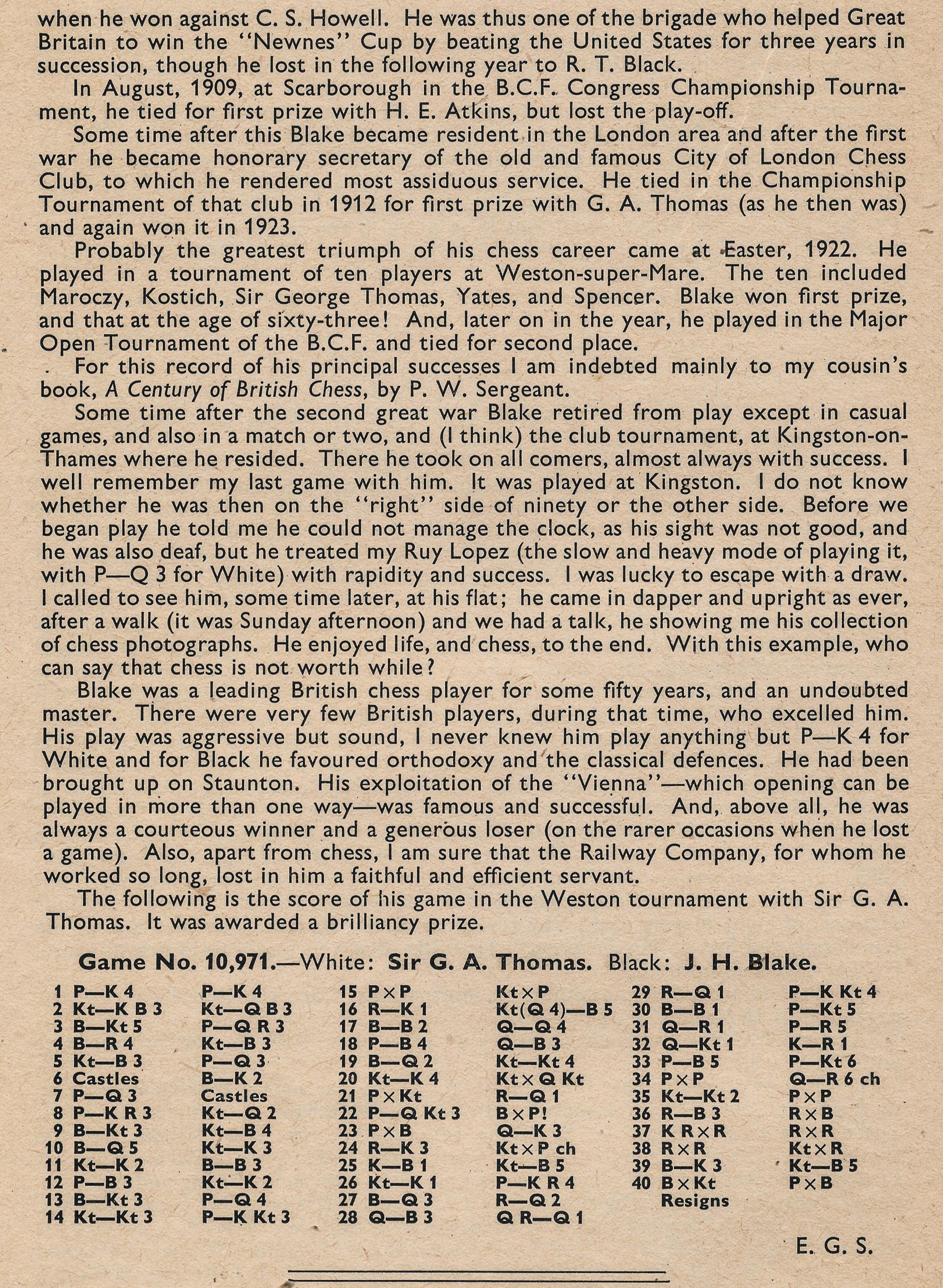
For more on this game and its often mis-reported continuation see this article from Edward Winter.
From Wikipedia :
“Joseph Henry Blake (3 February 1859, Farnborough, Hampshire – 11 December 1951, Kingston-upon-Thames) was an English chess master.
Blake won many tournaments played in England toward the end of the 19th century and the beginning of the 20th century. He won at Stamford 1887, Oxford 1891 (joint), Brighton 1892, Cambridge 1893, and Salisbury 1898 (joint). He also took 5th at Manchester 1882, tied for 3-4th at Birmingham 1883 (Section B), took 4th at Bath 1884, tied for 6-8th at London 1889 (Henry Bird won), took 2nd at Cambridge 1890, tied for 3rd-4th at Woodhall Spa 1893, shared 2nd at Craigside 1895, took 3rd at Hastings (Amateur) 1895, took 2nd, behind Henry Ernest Atkins, at Bristol 1896, and won at Folkestone 1901.
He took 2nd in an international correspondence tournament organised by Le Monde Illustré in 1895, shared 1st in the 1909 British Championship in Scarborough but lost to Atkins the play-off, and shared 1st at London 1911. He was British correspondence champion in 1922.
Blake represented England in cable matches against the United States in 1902, 1909 and 1910.
His best achievement was victory, ahead of Géza Maróczy, George Alan Thomas, Fred Yates and Boris Kostić, at Weston-super-Mare 1922. He shared 2nd at London 1922 (Major Open), tied for 7-8th at Hastings International Chess Congress 1922/23 (Akiba Rubinstein won), took 2nd, behind Thomas, at London 1923, took 5th at Liverpool 1923 (Jacques Mieses won), tied for 7-8th at Hastings 1923/24 (Max Euwe won), tied for 6-7th at Weston-super-Mare 1924 (Euwe won), took 2nd, behind R.P. Michell, at London 1925, took 4th at London 1926 (Victor Buerger won), and tied for 7-9th at Weston-super-Mare 1926 (Euwe won).”
He is the author of Chess endings for beginners (London 1900).
Best wishes FM Peter Batchelor (10-xii-1996)
Best wishes to FM Peter Batchelor on his birthday.
Peter J Batchelor was born on Tuesday, December 10th, 1996. “Breath” by The Prodigy was the UK Number One Single. His father is the player Guy Batchelor.
Peter’s first recorded rapidplay event was on the 17th of July 2005 in the Barnet Knights Under-9 tournament where he scored 4/6 and his first (!) standard play event was on August 20th 2005 being the British Land UK Terafinal which was not such a happy result.
His first published ECF grading was 56E in July 2006 at the age of ten with a rapidplay grading of 57A.
Peter played league chess in the Middlesex and London Leagues playing initially for Willesden & Brent and then with Wanstead & Woodford both with his father Guy.
Peter attended the Capital City Academy which is a “specialist sports and arts Academy in Willesden, North West London, in the borough of Brent.” He has returned there post-graduation to teach chess and run the school chess club.
Peter studied mathematics at the University of Warwick and now lives in London.
According to Ben Purton : “I captain Peter in the 4NCL chess league, he is one of the most professional and talented players on my squad. He is extremely smart and nice to be around. Peter would be an asset to any organisation in the future and any graduate scheme would be foolish not to take such a person on.
I have seen him grow in to one of the best U21 chess players in the UK and hope to see him gain his IM title soon.”
Peter became a FIDE Master in 2015 and, according to Felice and Megabase 2020 his peak FIDE rating was 2365 in December 2016.

Peter plays for Grantham Sharks in the Four Nations Chess League (4NCL).
With the white pieces Peter plays the Queen’s Gambit and the Trompowsky Attack.
As the second player Peter plays the Classical variation of the Caro-Kann and the Alartortsev Variation.
On chess.com Peter plays under the nom de plume of Pbatch.
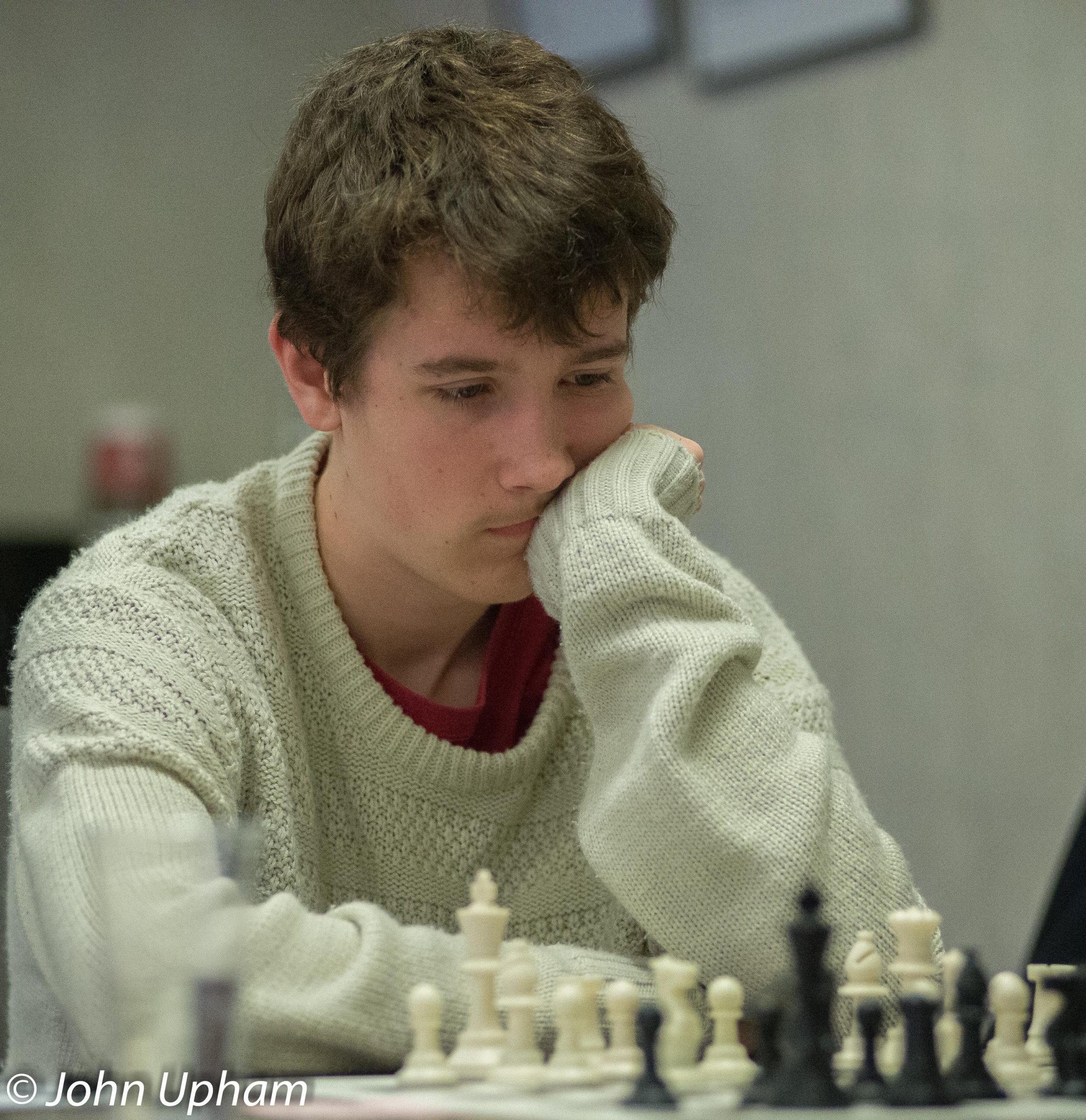
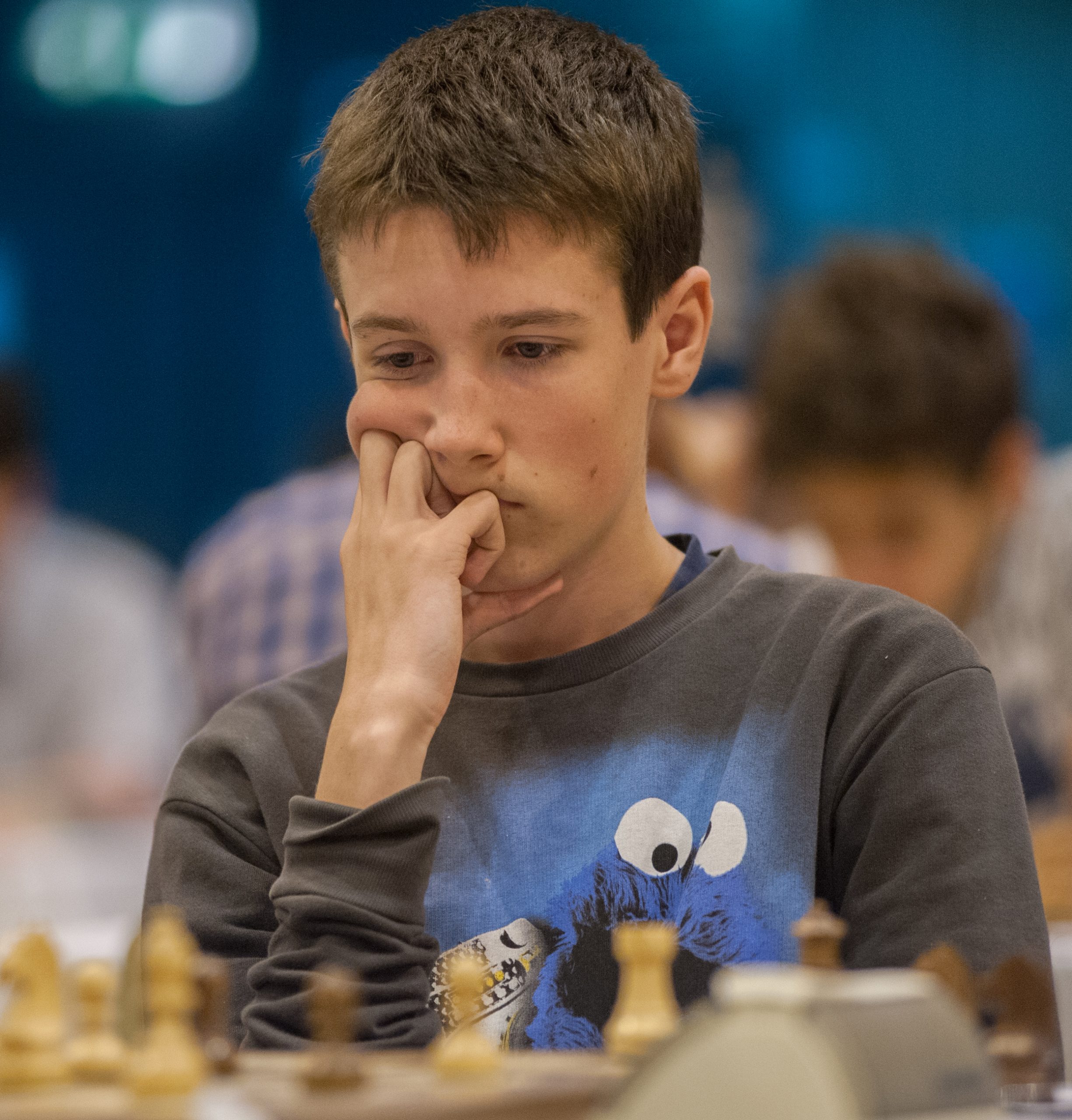
Happy Birthday IM John Hawksworth (06-xii-1963)
We wish happy birthday to IM John Hawksworth born on Friday, December 6th, 1963.
John Crofton Hawksworth was born in Brighton, England, in December 1963 to Robert Marshall Hawksworth and Norah Connor Hawksworth née Crofton. He was baptised at St Saviour’s Church of England church in Pimlico, London, in 1964.
The following was written (presumably by LWB) about John who was 15 just prior to the Spassky vs the BCF Junior Squad simultaneous display in 1979 :
“Bradford Grammar and Bradford. Rating 194. Yorkshire under-18 champion.”
He was awarded the IM title in 1986.
According to ChessBase his highest FIDE rating was 2370 in January, 1990 aged 27 which was the last year of serious competition at the 77th British Championships in Eastbourne.
He then pursued a highly successful career in the financial sector and became the Chief Economist for PriceWaterhouseCoopers.
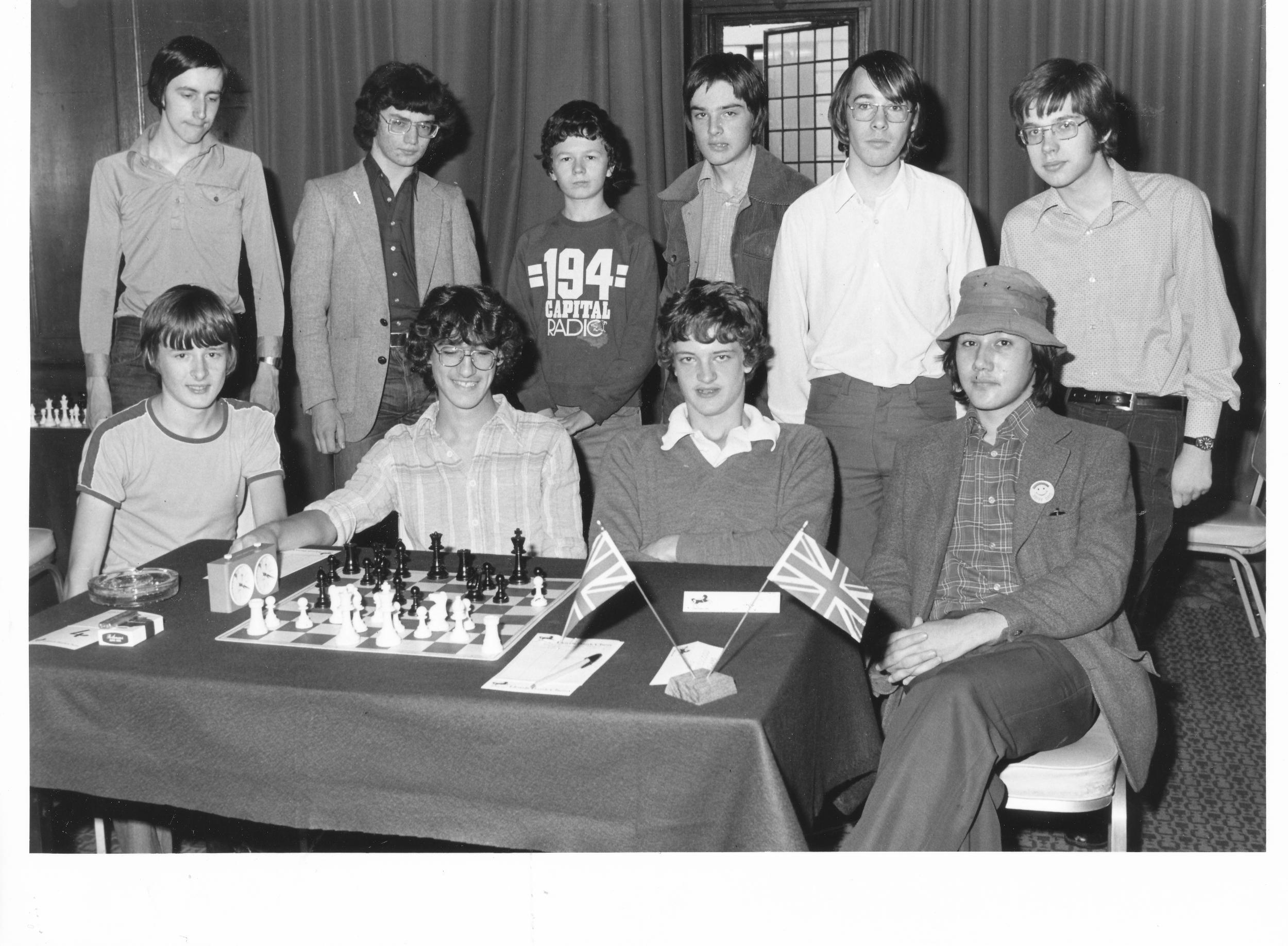
John now maintains his Hawkonomics blog and is a keen user of Twitter.
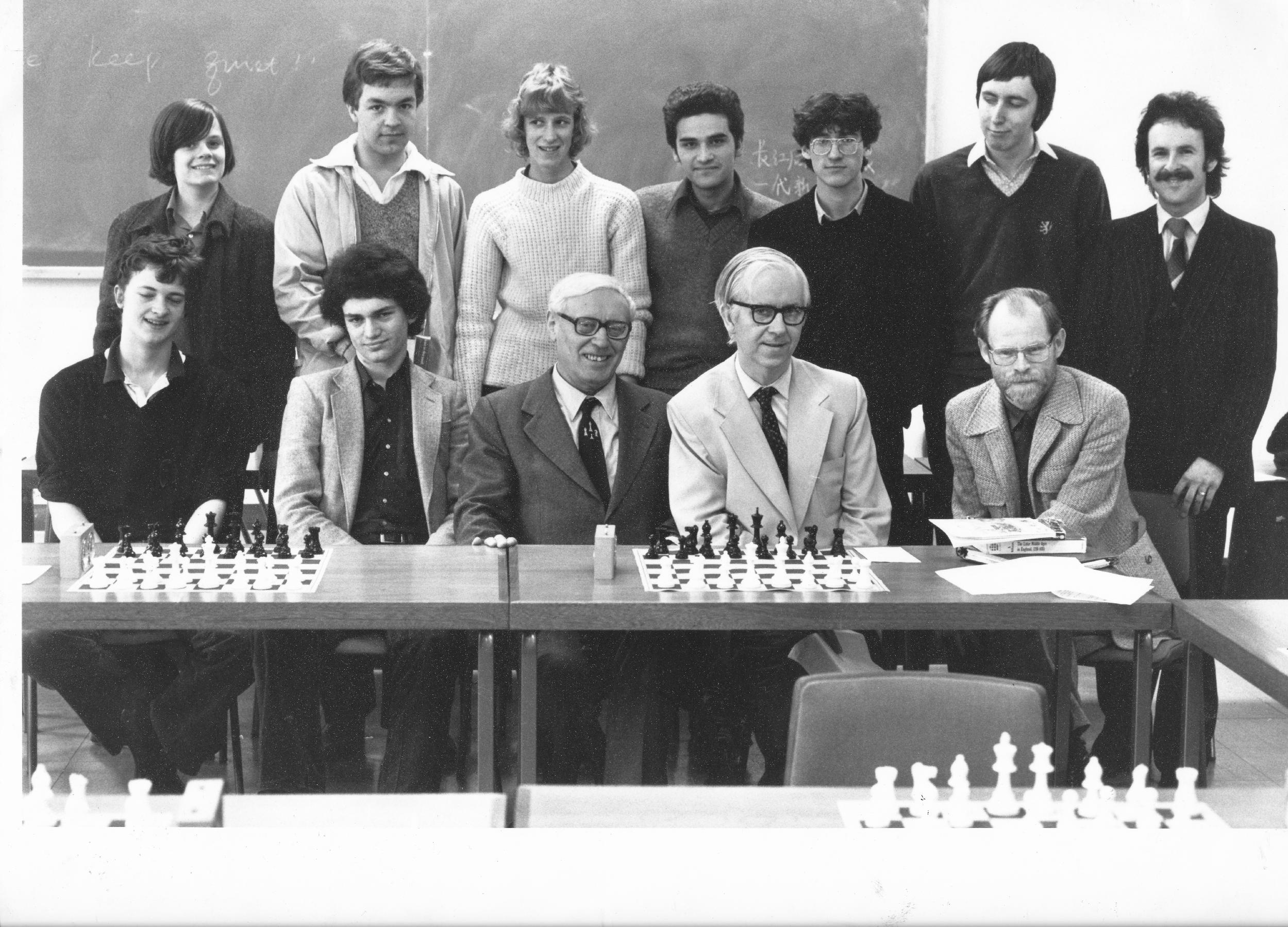
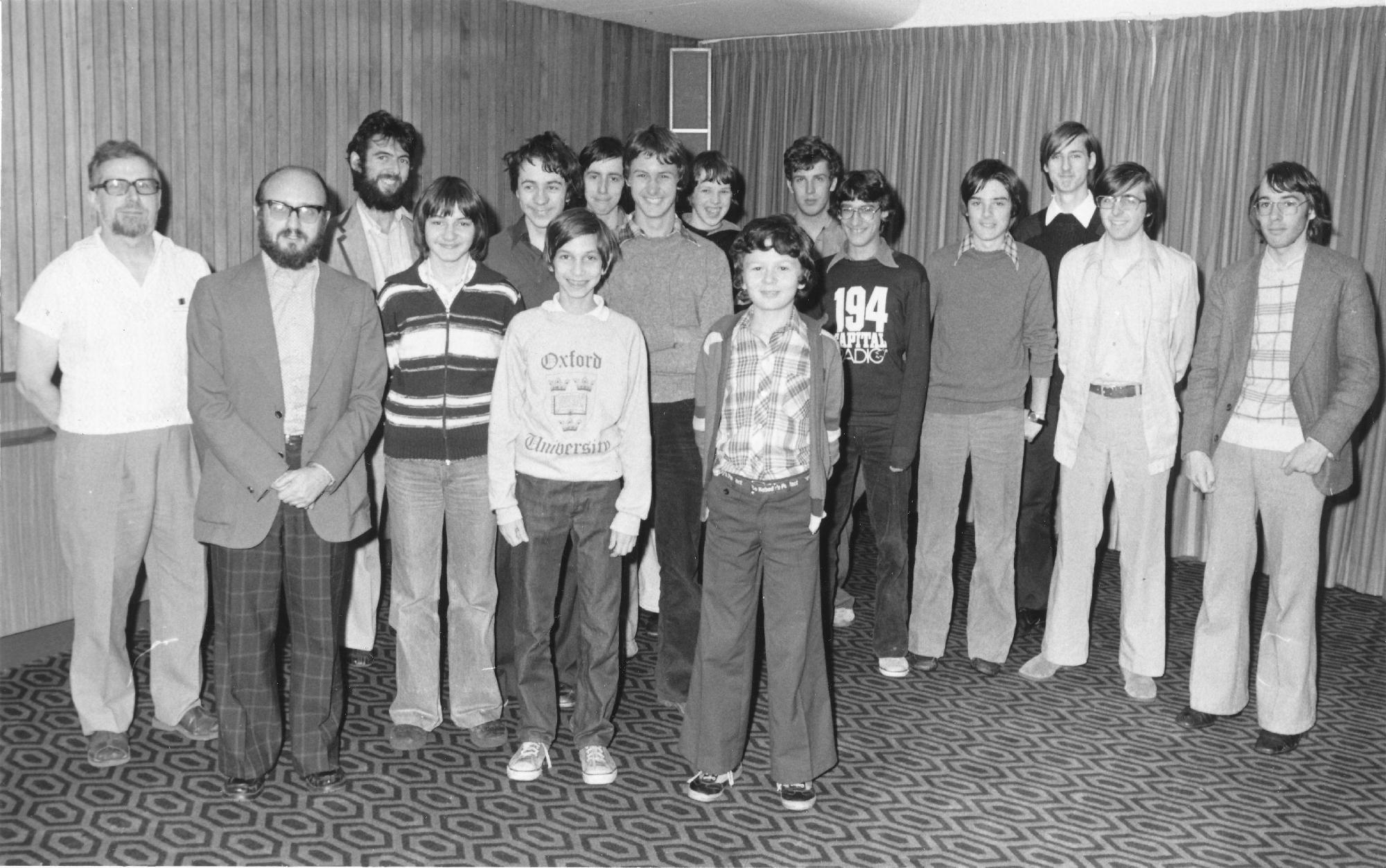
Happy Birthday GM Michael Adams (17-xi-1971)
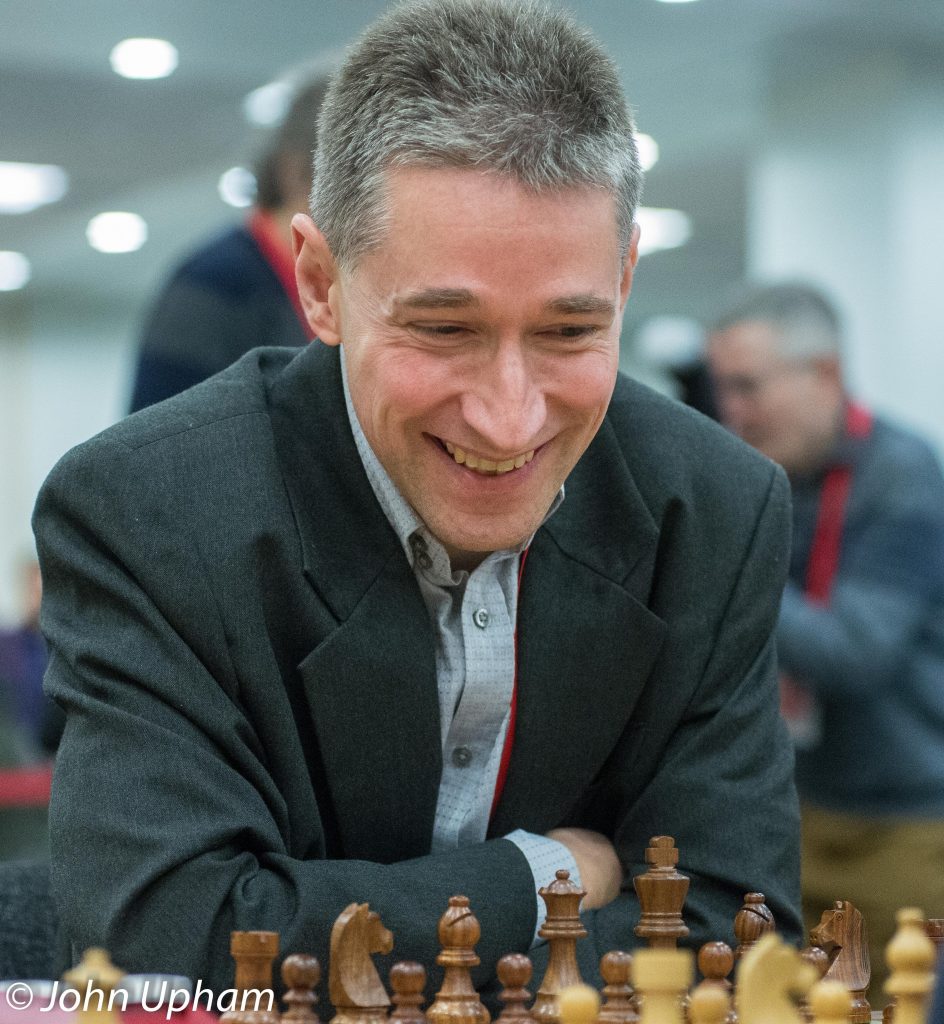
We send best wishes to GM Michael Adams on his birthday, this day (November 17th) in 1971
Michael was Southern Counties (SCCU) champion in the 1996-97 season.
His Wikipedia entry is here
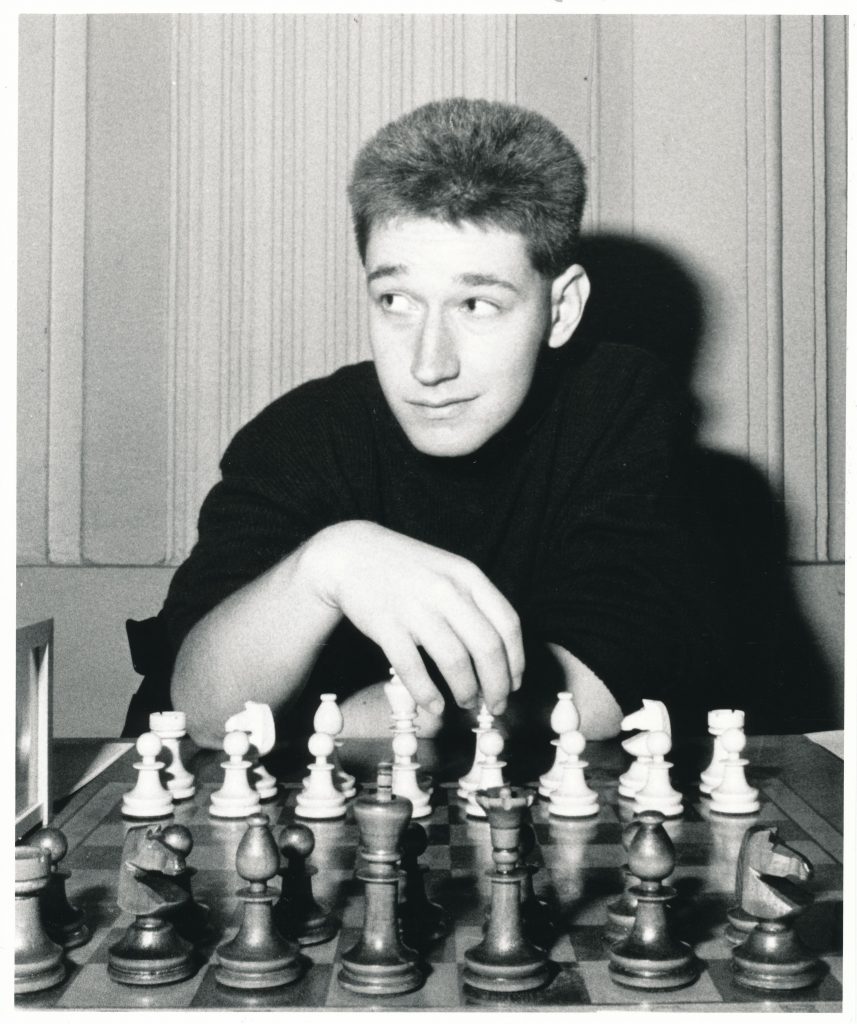

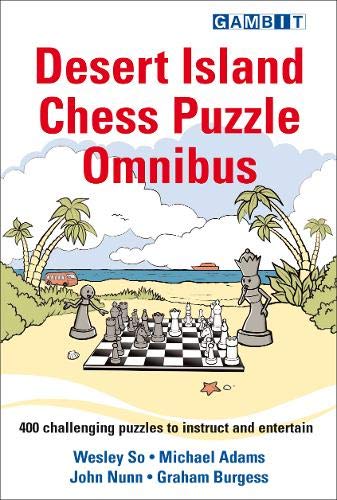
Remembering Gordon Crown (20-vi-1929 17-xi-1947)
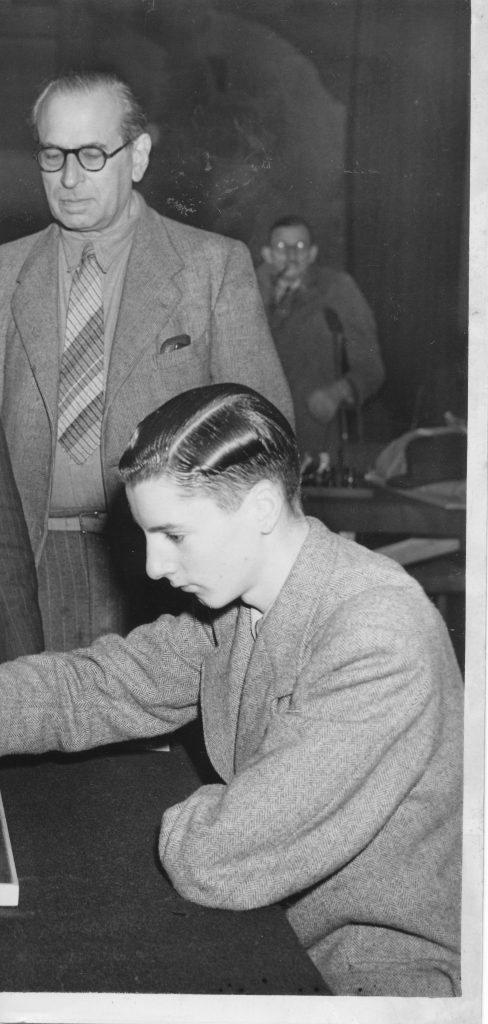
We remember Gordon Crown who died this day (November 17th) in 1947.
Gordon Thomas Crown was born on Thursday, June 20th, 1929 to James Crown (born 18th November 1899) and Hilda M Crown (born 3rd October 1900, née Sharrott).
James was a refrigerating engineer and Hilda carried out unpaid domestic duties. The birth was registered in the district of West Derby, Lancashire.
Gordon attended Holt Secondary School which is now known as Childwall Sports and Science Academy.
According to the electoral register of 1939 they lived at 8 Ingledene Road, Liverpool, Liverpool C.B., Lancashire, England. (This is L18 3HJ in this day and age.)

According to Zoopla : “This 4 bed freehold semi-detached house is located at 8 Ingledene Road, Liverpool L18 3HJ and has an estimated current value of £581,000. Ingledene Road has 19 properties on it with an average current value of £492,220, compared to an average property value of £325,035 for L18. There have been 5 property sales on Ingledene Road, L18 over the last 5 years with an average house price paid of £474,900. There are currently 108 properties for sale in L18 with an average asking price of £372,163 and 59 properties to rent in L18 with an average asking rent of £408 pw.”

Jon D’Souza-Eva (Oxford) wrote to us on November 17th, 2021 to reveal:
“I always thought that Gordon Crown was an only child, but after a little searching I found that he had a younger brother, Rodney, who was born and died in 1938.
There’s also a rather mysterious redacted entry in the Crown household in the 1939 register. I can’t find evidence for any other siblings who might account for it.”
and we asked Leonard Barden about this replying:
“I can’t confirm the Rodney, but Gordon died the night after I visited him on a daily leave pass from RAF Padgate. I didn’t know about it for two weeks because of the lack of news facilities at my camp. But then when I heard I wrote to his mother and she sent back the Kotov photo with a very sad letter from which one phrase has remained in my memory:
“Our other son died nine years ago and Gordon was all we had”….”
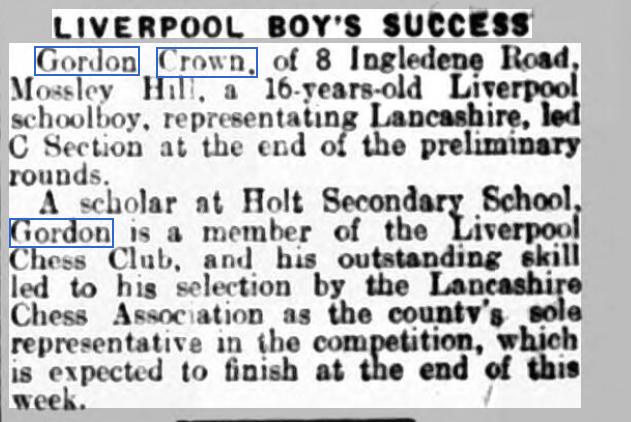
Both Sunnucks and Hooper & Whyld are silent on GTC : surprising!
From CHESS, Volume 12 (1947), Number 138 (March), page 176:
“G. T. Crown…England’s 17.5 Year Old International
“Gordon T. Crown, who takes his place in an England team at the age of 17.5, was born at Liverpool on June 20th, 1929. He learnt the moves at the age of nine, being first made aware of chess by the match between the BBC and the listeners over the radio. Until 1944, he had few opportunities for over-the-board play and was forced to devote himself to studying books and magazines.
In 1944-5 he entered for the Lancashire Junior Championship and won it as his first attempt; he repeated his success last year and also entered for the senior event, in which he reached the semi-final, only to throw away a won game against HG Rhodes.
In April 1946, he played in the British Boys’ Championship at Hastings and came second, losing only in his final game. In August he played in the Nottingham Congress, was placed in one of the Major sections and “was quite satisfied” he reports, at finishing half-a-point outside the prize list, especially as he was the only one to defeat EG Sergeant, who topped the section.
At Hastings, the situation was curiously reversed. Here he won the section, his only loss being to EG Sergeant, who finished just outside the prize list.
He has just finished school and is waiting to enter a University where he intends to study Geography and History. For private reading, he enjoys best Military and Naval History – apart from good detective stories.
Apart from chess, he is interested in most games, both indoor and outdoor, with special preference for tennis ad table-tennis when it is a matter of playing and cricket for reading about.
He is diabetic – but so was one of the players in the Davis Cup team which recently crushed Australia! His games show the evidence of deep and extensive study of the game combined with an ever-ready imagination.
From The Encyclopedia of Chess (Batsford, 1977), Harry Golombek OBE :
“Gordon Crown is one the sad might-have-beens of the world of chess. In his short life he had already shown himself to be of master strength and a potentially very great player when suddenly, at the age of eighteen, he died during an operation.
He learnt chess when aged nine and soon became one of the best players, first in Liverpool,, his home town, and then in Lancashire, of which county he won the Junior Championship three years in succession.
Crown first came into national prominence when he came second in the British Boys Championship in 1946. (Ed : the winner was John Fuller) In the Hastings Congress of 1946/7 he won first place in a strong Premier Reserves Section.
The last year of his life even saw him reaching out to international success, Playing on board 9 for Britain against The Netherlands he scored 1.5 out of 2 against L.J. Tummers. Then he won third prize in the British Championship at Harrogate. As a result of this success he was promoted to board 4 for Britain against Australia in a radio match when he beat Dr. M. Gellis.
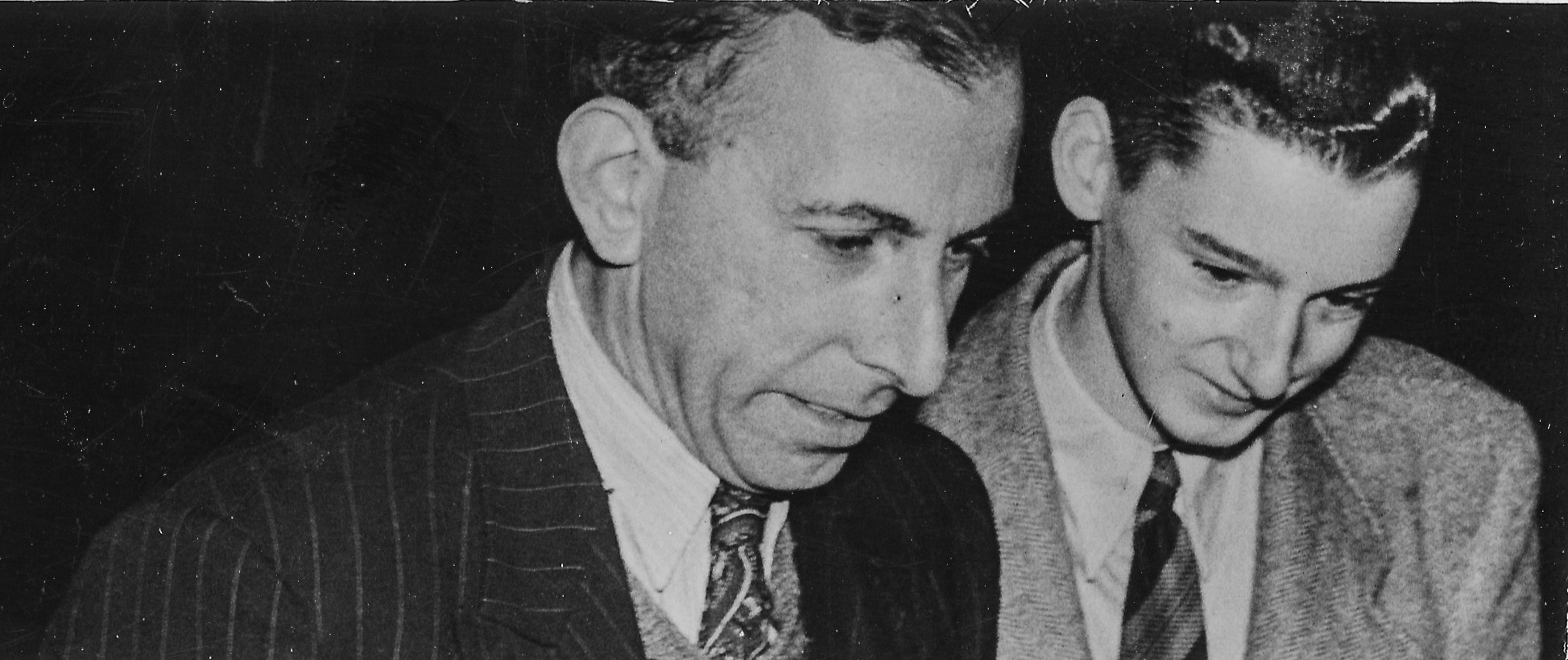
In September 1947 he was hurried to hospital suffering from peritonitis and, being a diabetic, succumbed under the operation.
As a player he excelled in both the opening and endgame phases and possessed a style of play that stamped him as a future grandmaster. As a person he was modest, clever and a very agreeable companion. This was great loss for British and, almost certainly, world chess.”
We have reproduced his obituary from British Chess Magazine, Volume LXVII (1947), Number 12 (December), Page 387-8 and we assume that this was written by TJ Beach:
“The tragic death of Gordon on November 17th after an operation, will be felt keenly-by chess players throughout the country. Although only l8 years of age he had risen to a high place in British chess circles. Learning the elements of the game in 1938, he had won the Lancashire Junior Championship in three successive years, was champion of the Liverpool Chess Club and Merseyside champion with 100 per cent scores last season, headed his section of the Premier Tournament at the last Hastings Christmas Congress, and, filling the vacancy caused by the late withdrawal of R. F. Combe the 1946 champion, took third prize in the British Championship played at Harrogate in August of this year.
In three international team matches he scored l.5 points on Board 9 against Tummers, of Holland; was one of the two British players to score a full point against the visiting U.S.S.R. team, sharing honours with Kotov in two finely played games on Board 4; and followed this with a win over Dr. Gellis, of Victoria, in the recent radio match with Australia, despite the earlier loss of the exchange through an oversight. His full match record for the past twelve months in international, county, and club matches read: won 16, drawn 2, and lost l. (to Kotov).
His play was notable for his exceptional knowledge of opening and end-game strategy, but his prowess was not by any means confined to “book” knowledge. Possessing deep positional insight, real combinational ability, and chess experience beyond his years, his concentration, tenacity, and determination to win had already made him one of the most formidable match and tournament players in the country. Many of us felt that he would become a worthy British champion within the next few years, and possibly reach even greater heights in the international sphere, and it is, perhaps, not too much to say that many chess players were already looking forward to the day when Gordon Crown would lead British chess to a high place in international esteem: Now those dreams have been rudely shattered, and the loss to British chess is great indeed.
Gordon Crown was not merely a youthful chess prodigy. Although suffering for many years from the physical disability which has now caused his premature death, he had a distinguished record at the Holt High School, Liverpool, and had entered Liverpool University only a month ago to read for the degree of B.A. Unable to play football and cricket, in which latter he was deeply interested, he became a tennis and table-tennis player of well above average ability and was an excellent exponent of billiards and snooker. Among other interests were cycling, and military history and strategy, in which he had read and studied widely.
No study of Gordon Crown would be complete without reference to his personality quite apart from his ability. Possessed of a quiet assurance and confidence in matters pertaining to chess, he was modest in victory, generous in his rare defeats, and ever ready to help small clubs by means of a lecture or simultaneous display.
Never too busy to play the humblest novice, he gave untold pleasure and a new interest in life to many men who had suffered during the war by introducing them to the
fascination of chess, and by this means helped materially in the vital task of rehabilitation. With charm and dignity Gordon Crown won a warm place in the hearts and affections of those who were fortunate enough to be counted among his friends, and whilst our deepest sympathy goes out to his parents in their tragic loss, they may well ae proud that their son achieved so much that was really worth while within so few years, for we shall remember Gordon with affection long after his chess exploits are but a dim memory.-T. J. B.”
The following is one of the last games, if not the last; played by Crown in competitive chess. Score and notes from “The Field”
and here is the scan of the original article:
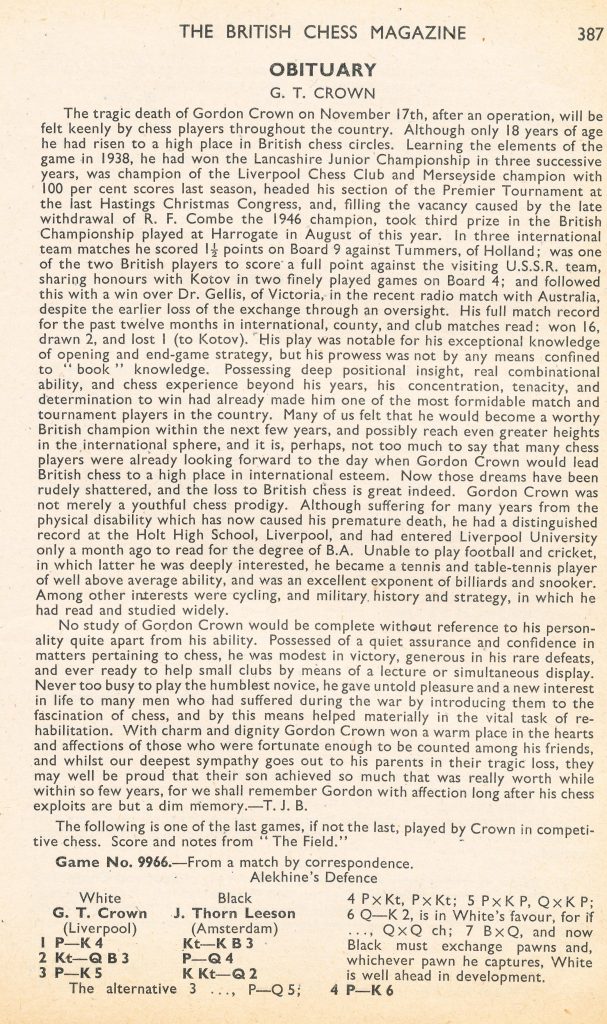
and
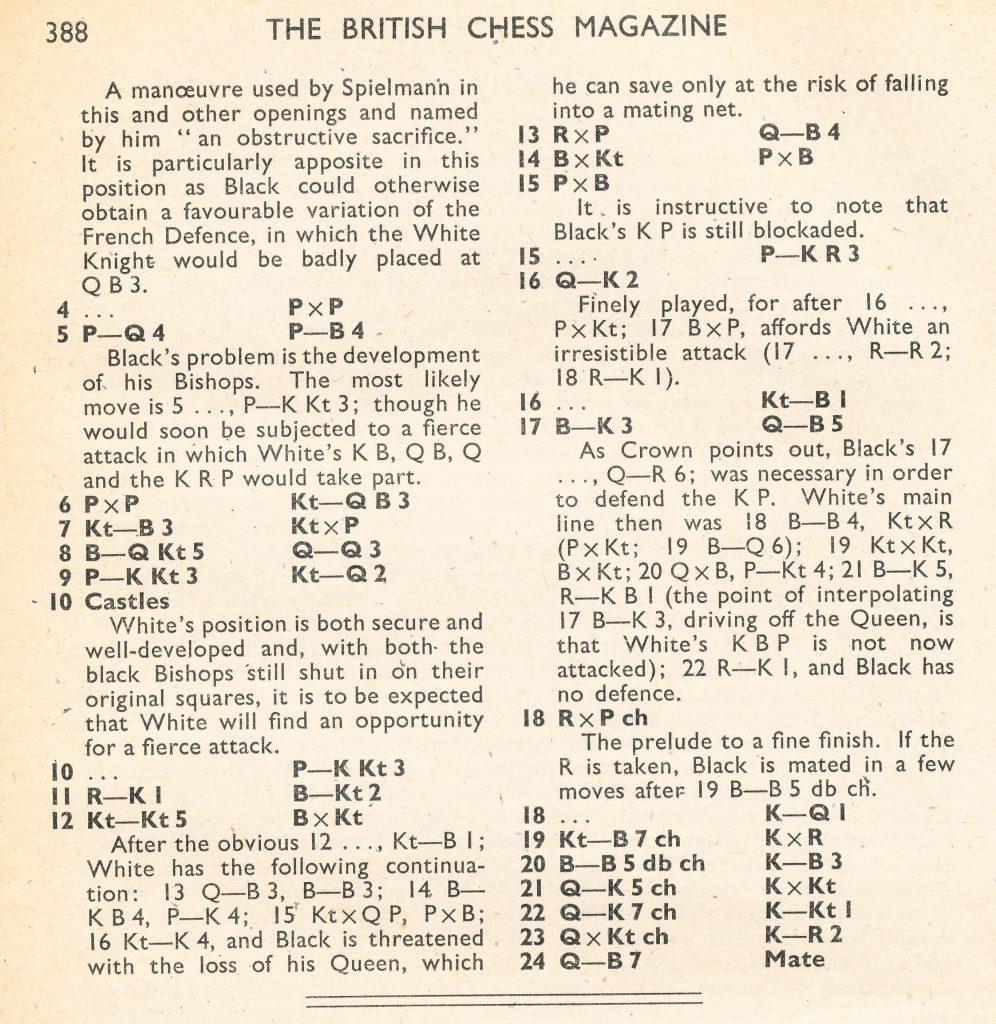
We are grateful to Leonard Barden on the identity of T.J.B. :
“Thomas John Beach, wartime RAF navigator with Distinguished Flying Cross, leading light of Liverpool chess, regular British championship player for many years, chairman of BCF junior selectors, father of a leading Midlands expert, a good and dedicated man” TJB was the father of Richard Beach who won the British Boys Under 18 title in 1961.
According to the British Chess Magazine, 1943, March, page 56 GTC lived at 8 Ingledene Road, Calderstones, Liverpool 18, England.
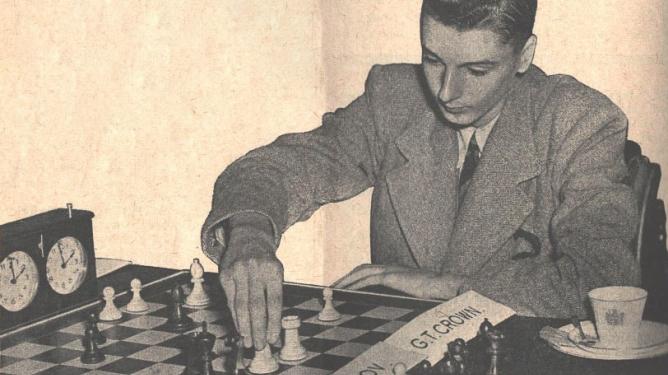
On 17 November 1947 he was admitted to hospital, complaining of a stomach upset. Diagnosed too late with appendicitis, complicated by his diabetes, he died in the operating theatre.
His friend (and former British champion) Leonard Barden speculates that had he lived, Crown would have become at least a strong Grandmaster, further noting that he was ” … open, friendly and modest as well as a clear and enthusiastic explainer of his chess ideas; I think he would have been like Keres or Gligoric in their countries, a model for our young players.”
Harry Golombek was similarly impressed with Crown’s play, stating that “In his short life, he had already shown himself to be of master strength and was potentially a very great player.”
We are grateful to be able to use comments from long time friend, Leonard Barden posted under the nom de plume of Roberts Partner on chessgames.com :
“As to the circumstances of Crown’s death. The finger of blame must be pointed at the family doctor for failing to make a timely correct diagnosis. On Sunday 16 November 1947 a chess friend visited the Crown home at Ingledene Road, Liverpool, and found Crown in bed. He explained that his doctor had diagnosed a stomach upset and had recommended rest. The friend and Crown played and analysed together for several hours, and Crown did not appear in any physical discomfort. But that night after the friend left his condition deteriorated and he was rushed to hospital where he died in the early morning hours of 17 November. There was also a belief among some Liverpool chess players that the hospital procedures could have been better.”
and
“On another thread some CG posters expressed surprise at the Ritson Morry v Crown game where Morry fell into a well-known opening trap.
The British championship at Harrogate in August 1947 was played in a spa building where the underfloor heating was still switched on. This coincided with one of the warmest summers on record (it was the year in which Compton and Edrich made their memorable cricket achievements for Middlesex). By the second week of the BCF congress older and overweight players (the latter group including Ritson Morry) were wilting. Ritson also had some long adjourned games, and by the time of his game with Crown in the final round was exhausted. The game finished in 15-20 minutes so by the time other players went to spectate after their opening moves there was just a reset board with no sign of the players and no indication of what had transpired. Other final round results went Crown’s way so that he finished third outright and thus got selected on a high board for the USSR match.”
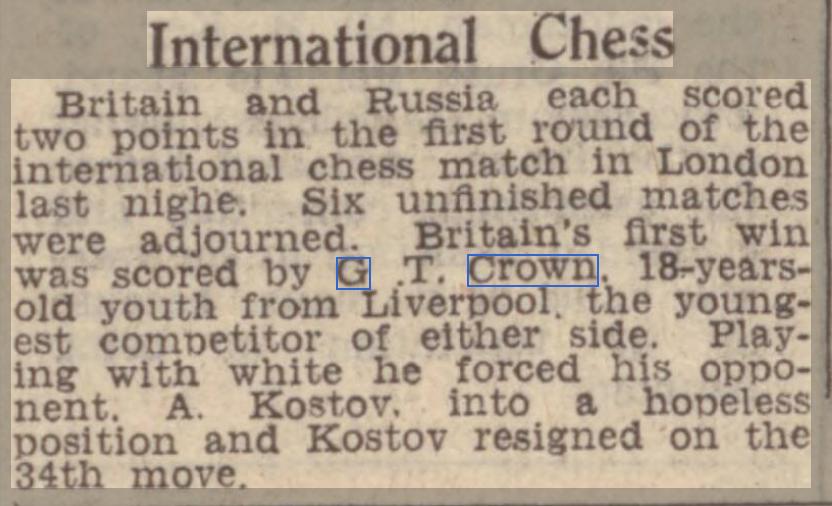
and here is an article by ddtru (?) in chess.com : full article
We are grateful to renowned chess historian, Taylor Kingston for supplying these scans of an article from Chess Life in 1947 about Gordon Crown written by Reuben Fine :
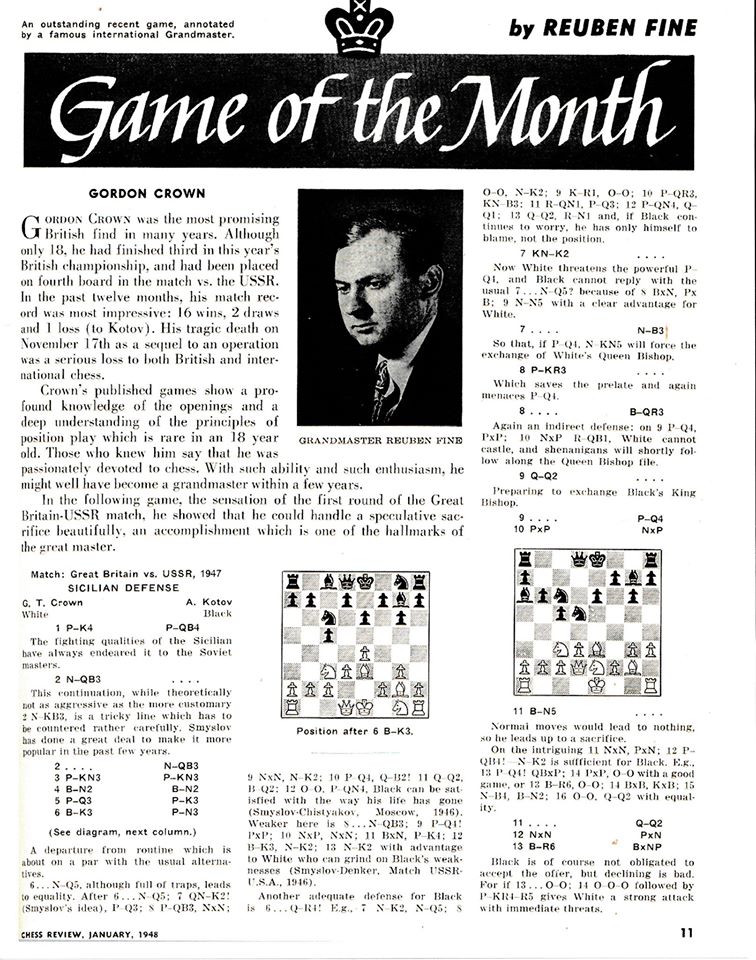
and
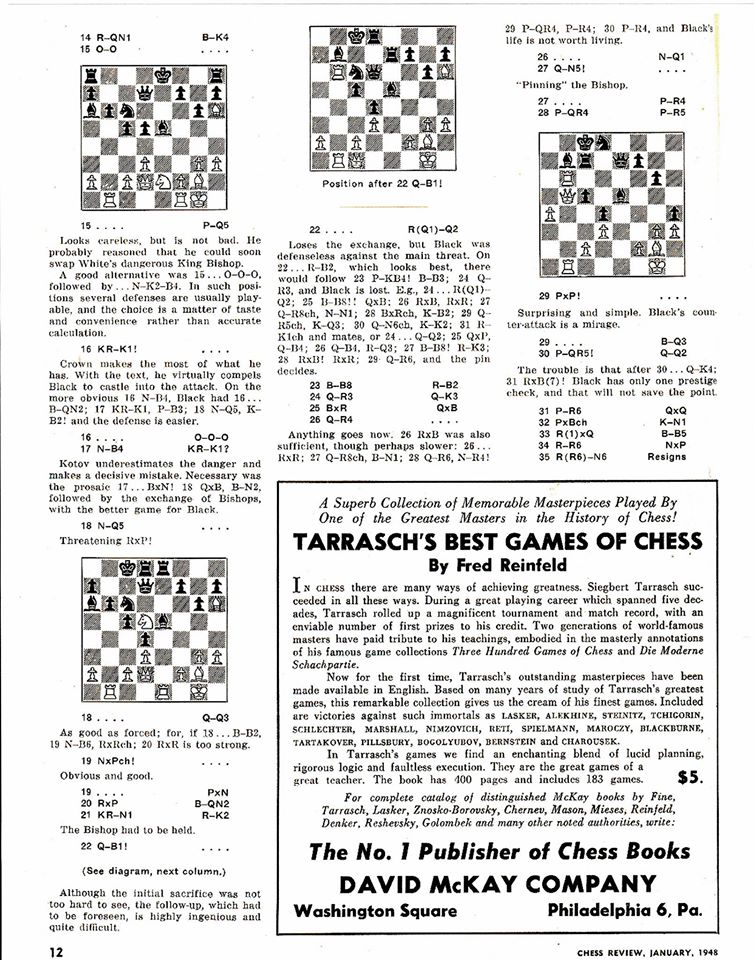
From Wikipedia:
“Gordon Thomas Crown (20 June 1929 – 17 November 1947) was a promising British chess player who died of appendicitis at the age of eighteen. He is best known for his win against the Russian Grandmaster Alexander Kotov shortly before his death.
Crown was born in Liverpool in 1929. He finished second in the British under 18 championship in 1946 and improved rapidly, winning the Premier Reserve section of the 1946/7 Hastings International Chess Congress. This led to his being placed on the reserve list for the 1947 British Chess Championship. Following the withdrawal of the defending champion Robert Forbes Combe, he was allowed to play in the championship, where he finished third (Harry Golombek won).
Consequently, he was selected to play for the British team in the 1947 Britain-USSR match, where he caused a sensation by defeating the Soviet Grandmaster Alexander Kotov, though he lost the return game. He also defeated Max Gellis in a Britain-Australia radio match.”
Interestingly, via the EC Forum, Geoff Chandler pointed out a note by Edward Winter in which Bill Hartston recounts advice from David Bronstein : “Look at the games of Gordon Crown. He really understood chess”. From NOW! magazine, (6-12 February 1981, page 80.): thanks Geoff !
